 21/02/2013 17:42 21/02/2013 17:42 |
|
| | | OFFLINE | | Post: 26.339
Post: 8.831 | Registrato il: 28/08/2005
Registrato il: 20/01/2009 | Administratore | Utente Master | |
|

Please see preceding page for earlier entries today, 2/21/13.I



Thursday, February 21, First Week of Lent

ST. PIER DAMIANI (Peter Damian) (Italy, 1007-1072)
Professor, Benedictine monk, Abbot, Papal Legate, Cardinal, Doctor of the Church
Benedict XVI dedicated a catechesis to the saint on September 9, 2009.
benedettoxviforum.freeforumzone.leonardo.it/discussione.aspx?idd=8527...
Born to an impoverished noble family in Ravenna, his brother Damian (from whom he takes his second name) put him through school where he excelled in languages and the law. A renowned professor in Parma and Ravenna by age 24, he decided to join the Benedictine monastery founded by St. Romuald in Fonte Avellana. Always an ascetic himself, he championed a return to the rules of early monasticism, and all his life, would champion reforms in the Church promulgated by the Popes of his time. Although he considered a hermit's life as 'the peak of Christian existence', he found himself being assigned to arbitrate local disputes and other missions from the Vatican, in addition to being a prolific writer (he is considered one of the greatest of medieval Latin writers). He became abbot at Fonte Avellana and founded five other monasteries. In 1057, he reluctantly accepted a papal appointment as Cardinal Bishop of Ostia, where he served for ten years, then obtained papal dispensation to return to Fonte Avellana. He carried out more missions for the Pope, and was returning from one when he fell ill and died. In the Divine Comedy, Dante called him the precursor of St. Francis. He was never formally canonized, but in 1878, Pope Leo XII made him a Doctor of the Church (Doctor of Reform and Renewal), the last of the Early Church Doctors.
Readings for today's Mass:
www.usccb.org/bible/readings/022113.cfm
AT THE VATICAN TODAY
The Holy Father is on the fifth day of the annual Lenten retreat with the officials and members of the Roman Curia.
The Prefecture of the Pontifical Household announced that on Thursday, February 28, the Holy Father will meet
with all the cardinals present in Rome at that time, in the Sala Clementina of the Apostolic Palace. This will be
his last official event as Pope. He departs the Vatican at 5 p.m. for Castel Gandolfo, where he will spend the first
two months of his retirement before returning to settle in the Vatican's Mater Ecclesiae monastery. Upon arrival
in Castel Gandolfo, however, he is expected to address the townspeople for the last time as Pope from the outer
balcony of the Apostolic Palace. His resignation takes effect officially after 8:00 p.m. one week from now, marking
the start of the sede vacsnte.
Tomorrow, Friday, Feb. 22, Bishop Juan Ignacio Arrieta, Secretary of the Pontifical Council for Legislative Texts,
will present a re-reading of the Apostolic Constitution Universi Dominici gregis on the vacancy of the
Apostolic See and the election of a new Pope to newsmen at the briefing room of the Vatican Press Office.
The Vatican also announced four new episcopal appointments by Benedict XVI (two in Argentina and two in Brazil,
as well as the creation of the Apostolic Vicariate of Puerto Leguizamo-Solano in Colombia and named its first
Apostolic Vicar.
|
| |
|
| |
 21/02/2013 19:07 21/02/2013 19:07 |
|
| | | OFFLINE | | Post: 26.340
Post: 8.832 | Registrato il: 28/08/2005
Registrato il: 20/01/2009 | Administratore | Utente Master | |
|

 Lombardi briefing:
Lombardi briefing:
Nothing new to report on the Conclave
But he denounces 'Repubblica' article about
alleged content of cardinals' report on Vatileaks

February 21, 3013
Pope Benedict XVI is studying a Motu Proprio regarding norms governing the Apostolic Constitution Universi Dominici Gregis, but “no date has been set yet for its promulgation”, and if there are changes to the Constitution governing papal transitions and the Sede Vacante “they will probably be small ones”, announced the Director of the Holy See press office Thursday in his briefing on Thursday morning.
Fr. Lombardi was flanked by Basilian priest Fr. Thomas Rosica of Canada who has flown in specially to aid the Vatican spokesman over the coming week, in translating for English language press.
Together, they addressed mounting press speculation regarding a number of issues in the lead-up to Pope Benedict’s departure from office one week from now. Such as the date for the beginning of the conclave.
Fr. Lombardi noted – and not for the first time – that the date will be decided by the cardinals when they gather in their first General Congregation.
He said “the date has not yet been established for the beginning of the meetings of the Cardinals although it’s recommended that it take place as soon as possible after the beginning of the Sede Vacante. It is being worked on right now and it will be announced”.
Turning to the expected Motu Proprio, he added “it has not come out yet - the Holy Father has the document. I don’t think we can expect substantial changes [to Universi Dominici gregis, which sets the rules for the sede vacante and the Conclave.]"
[It seems that the major purpose of the motu proprio is for Benedict XVI to authorize holding the Conclave earlier than the statutory 15-20 days after the start of the sede vacante, in view of the exceptional circumstances this time. So it will be a one-time authorization that will not change the statutory period prescribed for the usual case when a sede vacante results from the death of the Pope.]
Fr. Lombardi also spoke of the fact that while the Pope may seek advice on the Motu Proprio from Vatican canon law experts, the fine tuning is the Pope’s own. "The Pope pays attention to every single detail of his texts, often right up to the last minute. The Pope will not sign a motu proprio that is not really his." [What a gratuitous remark by Fr. Lombardi!]
Another important issue addressed Thursday morning was the February 22 deadline set by the Congregation for the Doctrine of the Faith for a final response from the FSSPX. Fr. Lombardi said that “given the extraordinary circumstances, the provisions for the reconciliation of the Priestly Society of St Pius X have been entrusted to the next Pontificate”.
Finally, the Vatican Press Office director confronted speculation in Italian press regarding the report drawn up by the Cardinals Commission of Inquiry, which was convoked by Pope Benedict in wake of the Vatileaks scandal.
Fr. Lombardi said he had spoken with Spanish Cardinal Julián Herranz Casado, who headed the inquiry, together with Slovakian Cardinal Jozef Tomko and Italian Cardinal Salvatore De Giorgi. “There will be no comment, denials or confirmation of what has been written in an Italian newspaper [about the cardinals' confidential report to the Pope]”, Herranz said.
However, Fr. Lombardi called attention to information in the same article regarding the last day of the Pontificate.
“From the very beginning Pope Benedict XVI’s schedule for the final day has been made public: a private meeting with cardinals in the Apostolic Palace and his departure via helicopter for Castel Gandolfo. Claims made in the article that he will receive anyone else are false. The claim that the Holy Father will go to Santa Maria Maggiore is also incorrect and unfounded”.
The press briefing concluded with Fr. Lombardi asking journalists to concentrate on 'the last days and great encounters of Benedict XVI’s pontificate'.
First, consider the source. The sleazy article cited by Fr. Lombardi, generously larded with pietistic remarks simulating sympathy for the Pope, appears in La Repubblica, arch-foe of the Church and Benedict XVI. It takes the form of the typical Italian news report of 'indiscrezioni' (i.e, rumor and gossip purported to be from 'inside' sources), different from the yellow journalism that is the stuff of tabloids only because the newspaper happens to be a leading Italian national daily.
The writer, citing 'sources close to the three cardinals', alleges that their inquiry into Vatileaks disclosed, among other things, power struggles among internal aggrupations (Jesuits, Salesians, Lombards, Ligurians, etc) - OK already, what's new about that? or rather, What? No Bertonians and Sodanians? - and the supposed existence of a secular 'gay lobby' of 'improper influence' that has established a network across many dicasteries of the Curia through their 'profane' relations with some members of the Curia. Gimme a break!: What would they be lobbying for - recognition of same-sex 'marriage'? Or smoking out any and all latent homosexuals in the various Curial offices?
However, the article reports no new concrete facts, but rehashes - while claiming the episodes are part of the cardinals' report - previously well-reported stories in the past like that of now ex-Curial priest Tommaso Stenico who was filmed by a hidden camera during an appointment with a male prostitute sent by an Italian TV channel; the homosexual activities with boys of Italian businessman Angelo Balducci who was made a Gentleman of the Papal Household under John Paul II (and was promptly dropped by the Vatican when his scandalous activities came to light 2 or 3 years ago); or linking a Bertone protege, Marco Simeon, who is a RAI executive, to the gay lobby (Simeon was earlier accused by Mons. Carlo Vigano to have been the author of anonymous letters to an Italian daily seeking to discredit Vigano).
The article's headline reads:
'Sex and careerism shakedowns at the Vatican were behind Benedict XVI's renunciation',
with the subtitle,
'Do not fornicate, do not rob, were the 2 commandments
violated in the dossier that upset the Pope'
even if nothing in the article itself says anything about money - merely that the cardinals looked into the angle and had interviewed everyone from Bertone's right-hand man, Mons. Ettore Balestrero, to the new financial consultant Rene Bruelhart.
The only remotely possible link in the story to anything about finances is the completely gratuitous information that Slovakian Cardinal Josef Tomko, one of the three cardinals in the commission, used to be John Paul II's head of counter-espionage (if you can believe it), who is alleged to have kept track of contributions to the 'Polish cause' presumably sent to the Vatican at the time. The writer then claims that after Benedict XVI's meeting with the cardinals at the Vatican, he would have a private audience with Tomko who would accompany him to Santa Maria Maggiore to greet Slovakian pilgrims.
It's the kind of highly questionable story - trial by insinuation - that I keep being shocked to see in Italy's most 'reputable' newspapers carry again and again.
Oh yes, I forgot. The writer claims omnisciently that Benedict XVI made his final decision to give up the Pontificate on December 17, 2012, after receiving the complete report from the three cardinals. (I have to check the date, but my recollection is that it was earlier reported verifiably that they submitted their report much earlier.)
[Modificato da TERESA BENEDETTA 21/02/2013 19:17] |
| |
 21/02/2013 19:50 21/02/2013 19:50 |
|
| | | OFFLINE | | Post: 26.341
Post: 8.833 | Registrato il: 28/08/2005
Registrato il: 20/01/2009 | Administratore | Utente Master | |
|
 Father Fessio’s Pope Benedict
Father Fessio’s Pope Benedict
The founder of Ignatius Press has been powerfully influenced,
personally as well as professionally,
by his 40-year friendship with the Holy Father .
by JOAN FRAWLEY DESMOND

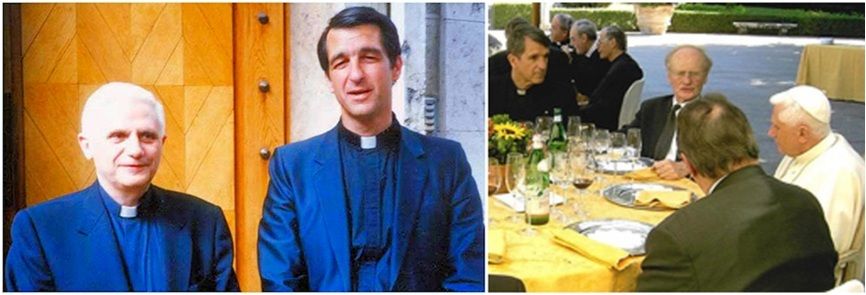 Left, with Cardinal Ratzinger in 1999. Right, at the 2007 Schuelerkreis seminar in Castel Gandolfo. The man in the center is philosopher Robert Spaemann.
Left, with Cardinal Ratzinger in 1999. Right, at the 2007 Schuelerkreis seminar in Castel Gandolfo. The man in the center is philosopher Robert Spaemann.
SAN FRANCISCO, Feb. 20, 2013 — As the founder of Ignatius Press, a leading publisher of Catholic theological works, Jesuit Father Joseph Fessio has tackled his fair share of turgid academic prose.
Thus he is especially appreciative of Pope Benedict XVI’s clarity — not only in his writing, but also his public statements.
In both cases, said Father Fessio, the Pope uses simple images and words to present complex themes and teachings.
Father Fessio has known Pope Benedict XVI since 1972, when the American priest began doctoral studies at the University of Regensburg, where then-Father Joseph Ratzinger had a strong following among graduate students.
Father Ratzinger was just 45 years old when the young American Jesuit from San Francisco arrived at the university, but the German-born academic had already earned a reputation for explaining difficult theological concepts in clear, incisive language.
“He was different, and people came to listen to him. He offered a very personal, meditative reflection. As people now recognize, he was articulate, organized and coherent,” recalled Father Fessio, during an interview that shared recollections of Ratzinger’s role as a teacher and offered an appreciation of his gifts as an author.
But Father Ratzinger’s intellectual gifts were even more striking during the graduate seminars, “where there would be five or six of us. In each session, one person would make a presentation, and others would respond,” Father Fessio remembered. “Father Ratzinger would listen, and then, in the discussion, he would make sure that others also spoke. My German was not good, and I couldn’t say very much.”
During the seminars, Father Ratzinger “would sit back, and then, at the end of the seminar, in two or three sentence, he would summarize all that was said. He pulled the discussion together into an organic whole in a way that was always illuminating.”
Father Fessio soon learned that the same luminous clarity enlivened Father Ratzinger's published works.
“Back in 1968, when he published the Introduction to Christianity, the prose was already there,” said Father Fessio, referring to a work that remains a key textbook for graduate theological studies.
When the Catechism of the Catholic Church was completed in 1992, during the pontificate of Blessed John Paul II, Father Fessio reviewed the text and immediately noticed that it bore signs of Joseph Ratzinger’s distinctive ability to synthesize challenging material. At the time, then-Cardinal Ratzinger was the president of the catechism’s Preparatory Commission, which worked for six years to complete the project.
“When I first received the Catechism, I spent a whole retreat meditating on the Table of Contents — it was so beautiful. The Catechism wasn’t just a summary or a book of lists, it presented the faith as an organic whole,” said Father Fessio.
After his mentor was elected Pope, Catholics across the globe had their first taste of Benedict’s literary gifts.
“Love is possible, and we are able to practice it because we are created in the image of God. To experience love and in this way to cause the light of God to enter into the world — this is the invitation I would like to extend with the present encyclical,” wrote Pope Benedict XVI in Deus Caritas Est, his first encyclical.
“He is like a painter using his palette to produce a portrait,” said Father Fessio, noting that the Pope also managed to work his magic in collaborative synodal documents as well as his encyclicals.
“He uses simple images — light and dark. You notice the same thing when you open up The Lord of the Rings and begin reading a paragraph: The majority of words are one syllable, and they convey profound thoughts and emotions.”
Thus, when Pope Benedict was enthroned in 2005, “he talked about the pallium, and telling cardinals, he noted that red is for martyrdom.”
Over the course of more than 40 years, Father Fessio has stayed in touch with his former professor, meeting with other students from Regensburg for annual gatherings and collaborating on a variety of projects. During that time, the priest said, he has witnessed very little change in the man who will resign from the Petrine office on Feb. 28.
“He was always a theologian of the Church,” he said. “I saw the same man doing the same thing in different settings. He is a faithful servant, and Blessed John Paul II relied on him a good deal.
“But look how the liturgy changed as soon as Benedict was made Pope. Chant was introduced. It means that he was not in favor of the kind of liturgies that Pope John Paul II celebrated, but he accepted it. And when he was Pope, he acted differently.”
Indeed, while media commentators still dredge up Cardinal Ratzinger’s nickname of “God’s Rottweiler” from his days as prefect of the Congregation for the Doctrine of the Faith, Father Fessio has “never heard him raise his voice. He was always a listener, even at the CDF.”
“I wouldn’t call him shy; I would call him reserved. He is not someone who would enjoy a cocktail party,” said Father Fessio.
“Yes, he is firm. He has tremendous confidence because he has confidence in Christ. Friendship in Christ: It is the bass note in all his work.”
The resulting spiritual serenity sustained him amid the tumultuous decades following the Second Vatican Council, when the German cardinal sparked animosity by insisting that the Council did not constitute a break with the continuity of Catholic Tradition.
Father Fessio recalled a remark the Pope made during a meeting some time after his election.
Another Catholic publisher asked the Holy Father why only Ignatius Press was publishing his works. Father Fessio recalled that the Pope calmly responded, “Because when no one else cared, they published my works.’”
When Father Fessio learned that the Pope would resign during Lent, he quickly grasped the significance of his timing.
“He was born during Holy Week,” he said. “And I am confident he chose the time for his resignation because he wanted the next Pope as an ‘Easter’ pope, with time for reflection.”
Added Father Fessio, “His life begins and ends with the Paschal mystery.” [Ooops! Excuse me, it hasn't ended...]
[Modificato da TERESA BENEDETTA 21/02/2013 19:59] |
| |
 21/02/2013 23:45 21/02/2013 23:45 |
|
| | | OFFLINE | | Post: 26.342
Post: 8.834 | Registrato il: 28/08/2005
Registrato il: 20/01/2009 | Administratore | Utente Master | |
|
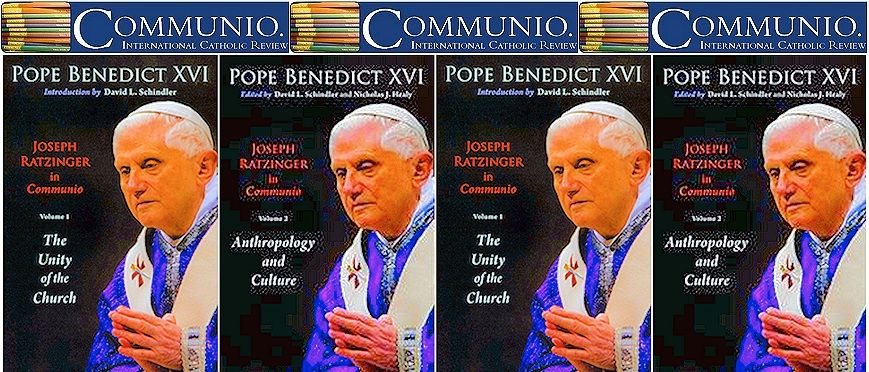 Finding the following little item in the February 20 issue of L'Osservatore Romano, I could almost think the world still is as it was before 11:30 a.m. of February 11, 2013... If Fr. Schall says Joseph Ratzinger has already written much more than Augustine or Aquinas, then surely he has written much more than any other Pope...
Joseph Ratzinger in 'Communio':
Finding the following little item in the February 20 issue of L'Osservatore Romano, I could almost think the world still is as it was before 11:30 a.m. of February 11, 2013... If Fr. Schall says Joseph Ratzinger has already written much more than Augustine or Aquinas, then surely he has written much more than any other Pope...
Joseph Ratzinger in 'Communio':
Essays on anthropological topics
Translated from the 2/20-2/21 issue of

Hope, technological security understood as a problem of social ethics, man between reproduction and creation, Jesus today, the significance of Sunday, God in John Paul II’s Crossing the Threshold of Hope…
These are some of the subjects chosen by Joseph Ratzinger for 14 articles written between 1972 to 2005, before he became Pope, and which have been anthologized in a book entitled Joseph Ratzinger in Communio: Anthropology and Culture(Michigan-Cambridge, W. B. Eerdmans Pub. Co, 2013, 199pp), edited by David L. Schindler and Nicholas J. Healy.
This is the second volume dedicated to the writings of Joseph Ratzinger in Communio, an international journal on theology and culture published quarterly in English and a dozen other languages. It was founded in 1972 by a group of theologians who had taken part in the Second Vatican Council, including Hans Urs von Balthasar, Henri de Lubac, Jean-Luc Marion and Joseph Ratzinger himself.
The first volume. Joseph Ratzinger in Communio: The Unity of the Church, edited by David Schinler, was published in 2010. In his foreword to the second volume, Schindler says that the aim is to republish all the contributions made by Professor, later Cardinal, Ratzinger, to the North American edition of Communio since its initial publication in 1974.
Despite the difficulty in clearly demarcating the articles by subject matter, they have been grouped under three broad headings: Church, anthropology and theological renewal. The third volume will be devoted to the writings on theological renewal.
NB: The theologians who founded Communio had broken away from the magazine Concilium, which they co-founded in 1865 with other theological consultants from Vatican II in order in order to propagate its teachings to the academic community. Their co-founders included the progressivist theologians Karl Rahner, Hans Kueng, Johann Baptis Metz, Edward Schillebeeckx, etc. Ratzinger et al broke away when the magazine turned into a mouthpiece of the so-called 'spirit of Vatican II' which the Balthazar-de Lubac-Ratzinger group considered a distortion of the Council.
With the item, the OR carried this picture captioned 'Archbishop Ratzinger in November 1977'
(One of the earliest pictures we see the cardinal in a beret):
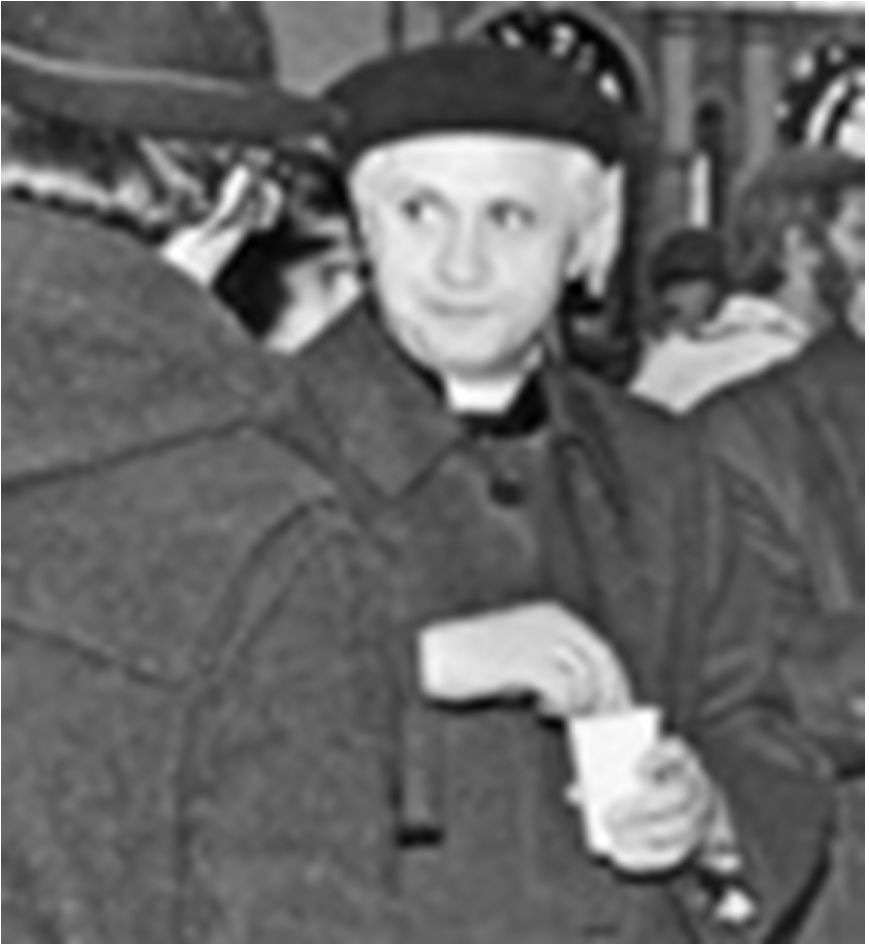
[Modificato da TERESA BENEDETTA 21/02/2013 23:47] |
| |
 22/02/2013 01:46 22/02/2013 01:46 |
|
| | | OFFLINE | | Post: 26.343
Post: 8.835 | Registrato il: 28/08/2005
Registrato il: 20/01/2009 | Administratore | Utente Master | |
|
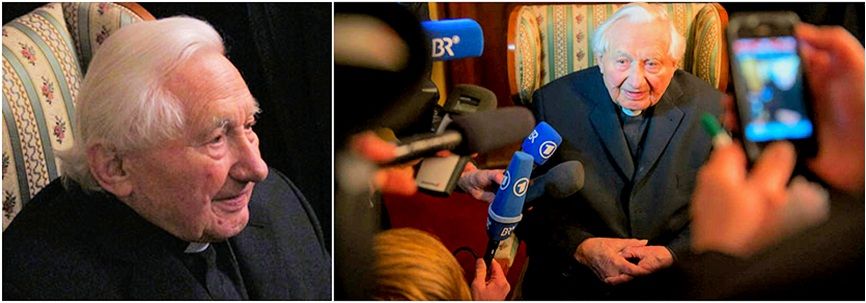 Mons. Ratzinger being interviewed by German media at his Regensburg home last week.
Pope's retirement 'an act of responsibility'
Mons. Ratzinger being interviewed by German media at his Regensburg home last week.
Pope's retirement 'an act of responsibility'
and a human decision inspired by God'
Interview with Georg Ratzinger
by Paolo Lepri
Translated from

February 21, 2013
REGENSBURG - In the city from which Johannes Kepler had scrutinized the heavens, Mons. Georg Ratzinger measures time with music, Especially that of Bach and Mozart, two musical greats from the past, to whom he compares his brother because like them, he is a protagonist of the transforming encounter between the old and the new.
From the window of his small home, he can see the filigreed spires of the Cathedral. The world seems remote, but God is near. He does not need to seek him. A little farther towards the Danube is the apartment where Oskar Schindler lived for some years. Other souls, other rescues.
Alongside many pictures of Joseph Ratzinger - to whom he is bound by a solid affection that is very moving, even almost a bit secular, for two men who are so profoundly tied to religion - there is a large portrait dedicated to him by John Paul II, of which he is very proud.
We ask him if the Church once again needs a Pope as young as the Polish cardinal was when he became Pope at age 58.
If at were up to him, he says, he would like someone with the same firmness of faith as his brother, but without the white hair, which he too shares with the brother he attended seminary with. "We need a man deeply rooted in the faith who will protect the weak," he adds.
At 89, the former music director of the Regensburg Cathedral choir, walks using two canes. He is calm, but admits that at times he gets overwhelmed by the fact of his advanced age. The thought that he is practically blind also makes him sad.
He sits with us at a round table with a damask tablecloth and a bottle of mineral water. So many memories, but no regrets, he says.
Herr Praelat, more than a week has passed since the Pope announced he was stepping down. Now many are saying that his decision represents a revolt against tradition, of a step taken to change the Church. Is that a right interpretation?
No. I don't think that was his purpose at all. His mission has been to lead the faithful to live by the Word of God. A difficult mission in a secularized society.
He has been praised for his courage. Does his gesture also imply a personal defeat?
It is absolutely not a personal defeat. In old age, man loses so much of his capacities. I know that for myself. Old age is a rupture in life - it makes us unable to do what used to be normal. Leadership of the Church requires someone in full possession of his energies because there are so many challenges that have to be met.
What did you feel several months ago when the Pope first told you of his intentions? Did something happen that has remained unexpressed?
No. He spoke to me of his intention, and I listened. Of course, I also felt some regret, because after my initial uneasiness at his election, I was very happy, despite my concerns for him. But I am a realist and I knew the day would come when his human capacities would be inadequate for his great responsibility.
Were you already concerned at the time of the Conclave in 2005?
Well, he was elected at such an advanced age. And he has never been a robust person. Frankly I thought that at 78 years, his professional life ought to be over, and that he could live a much lighter life.
Did you ever discuss, at that conversation about his decision, the possible consequences of resigning the Papacy?
No, even if it was always clear to me that it would lead to some psychological fatigue. But I agreed with him. I share his sense of responsibility for the Church. He felt that it was his duty to do it and that he needed to do it, knowing all the possible consequences.
So it was a decision he took by himself. Who did he confide it to, other than yourself?
It was a human decision inspired by God. I do not know if he spoke about it to someone other than me, but when he told me he wanted to resign, he had already made his decision.
There are a few more days to go before the sede vacante. What do you think your brother's role will be after this? Hans Kueng has warned of the possibility of a 'shadow Pope'. What do you think?
No, my brother would never wish to be a 'shadow Pope'. He would not want to encumber his successor in any way. His public responsibility will end, and after that, the center of his life will only be his responsibility to God, in a life of meditation. But I think he will still be called Benedict XVI.
Who do you think will be his successor? If you were a cardinal elector, whom would you pick?
There are so many capable and meritorious cardinals. But I would like the new Pope to be profoundly rooted in the faith, that his life is guided by the faith. And he should have a great respect for the weak in society. It is also indispensable that he is a realist, who knows what can be done and what cannot, just yet. He will need tremendous energy to lead a Church that is so large and to have his message reach everyone. So they will most likely pick a younger man.
Benedict XVI told Peter Seewald that he was both the end of the old and the beginning of the new. What do you think? Some commentators say that he has made himself closer to the people because of his resignation.
His decision will probably lead to something new. And yes, it could help bring the office of Pope closer to the faithful. Until now, the papacy has been a lifetime job. But he has shown that he ascended Peter's Chair without vanity, he did so only out of responsibility. He accepted the office out of responsibility, and he is leaving it because of responsibility. I think people appreciate this.
During his Pontificate, some reforms were carried out but some not, as for instance, ordination of women.
Because that question is closed, dogmatically and definitively. Priesthood is reserved for men who act in persona Christi and reflect his image.
But isn't this one of the causes of the crisis of religion in Germany? In the past 20 years, four million Germans left the Church.
I was not aware of such figures. But there are other reasons. For instance, all the news about sex abuses. It is a terrible problem, which we must all make amends for. And yet episodes like this do not happen only within the Church, but everywhere. When the Church is involved, however, the reaction is always disproportionate.
When will you see your brother next? Did you ever plan to live together once more as you did when you were young?
We have grown old sharing mutual affection and reciprocal respect. We have always been happy for each other when one of us does good work. It has been like sharing a common responsibility.
I will not be going to Rome for the final days of his Papacy. I prefer to wait until Holy Week. But I will continue to live in Regensburg, where I am at home. And he too will not be moving out of the Vatican because he needs to be by himself. So I will visit him from time to time.
You have written a book about him. What is your image today of your brother?
I am not a poet. People will know - I think they have acquired a good idea of who he is. Thanks even to TV. I just wish to say that the nickname Panzerkardinal absolutely had nothing to do with him. He's not a man of steel. He is a very sensitive man.
And therefore very vulnerable to criticisms, to attacks, to scandals?
No. He places things in perspective, and he knows that these attacks merely reflect a world that is full of so many other expectations. In any case, whenever someone attacks him, he has always firmly kept to his position, with the help of his faith.
[Modificato da TERESA BENEDETTA 22/02/2013 01:48] |
| |
 22/02/2013 21:57 22/02/2013 21:57 |
|
| | | OFFLINE | | Post: 26.344
Post: 8.836 | Registrato il: 28/08/2005
Registrato il: 20/01/2009 | Administratore | Utente Master | |
|
|
| |
 22/02/2013 21:58 22/02/2013 21:58 |
|
| | | OFFLINE | | Post: 26.345
Post: 8.837 | Registrato il: 28/08/2005
Registrato il: 20/01/2009 | Administratore | Utente Master | |
|

 Friday, February 22, 2013 First Week of Lent
Friday, February 22, 2013 First Week of Lent
FEAST OF THE CHAIR OF ST. PETER
The last feast day with Benedict XVI on Peter's Chair

The feast commemorates Christ’s choice of Peter to sit in his place as the servant-authority of the whole Church. Already in the second half of the 8th century, an ancient wooden Chair
inlaid with ivory was venerated and traditionally held to be the Episcopal chair on which St. Peter sat as he instructed the faithful of Rome. In fact, it is a throne in which fragments
of acacia wood are visible, which could be part of the chair of St. Peter, encased in oak and reinforced with iron bands. Several rings facilitated its transportation during processions.
Pope Alexander VII commissioned Bernini to build a sumptuous monument which would give prominence to this ancient wooden chair. Bernini built a throne in gilded bronze, richly
ornamented with bas-reliefs in which the chair was enclosed: two pieces of furniture, one within the other. It was installed in 1666 on the altar just below the alabaster window
depicting the Holy Spirit. Every February 22, the altar of Peter's Chair is decorated with dozens of lighted candles, while the familiar black sculpture of St. Peter is dressed in full papal
regalia. Quite ironically, this is the last significant feast day of Benedict XVI's Pontificate.
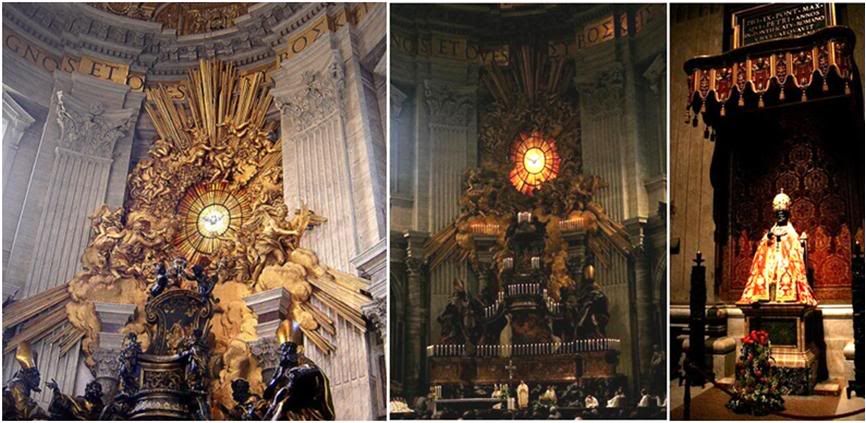 Left, Bernini's altar of Peter's Chair - the Church Doctors holding up the Chair are, on the left, Augustine and John Chrysostom, and on the right, Athanasius and Ambrose. Center, the altar with the lighted candles
Left, Bernini's altar of Peter's Chair - the Church Doctors holding up the Chair are, on the left, Augustine and John Chrysostom, and on the right, Athanasius and Ambrose. Center, the altar with the lighted candles
on Feb. 22; right, Arnolfo di Cambio's sculpture of St. Peter, dressed in papal regalia every Feb. 22.
Readings for today's Mass: usccb.org/bible/readings/022213.cfm
AT THE VATICAN TODAY
The Holy Father is on the sixth day of the Lenten retreat for the Roman Curia. It ends tomorrow with
a final morning session. All in all, there were 17 meditation sessions, each lecture preached by
Cardinal Gianfranco Ravasi, president of the Pontifical Council for Culture.
At the Vatican Press Room, Mons. Juan Ignacio Arrieta, Secretary of the Pontifical Council for Legislative Texts,
held a briefing for newsmen on the Apostolic Constitution Universi Dominici Gregis which spells out the rules
for Vatican governance during the sede vacante, as well as for the Conclave to elect a new Pope.
vacanza della Sede Apostolica e l’elezione del Romano Pontefice.
Among a number of new papal appointments announced today, the most significant was a change in the hierarchy
of the Secretariat of State, with its Under-Secretary for Relations with States, Mons. Ettore Balestrero,
named to be Apostolic Nuncio to Colobmbia and elevated to the dignity of Archbishop. Named to take his place
as Under-Secretary is Mons. Antoine Camilleri, who has been the private secretary to Mons. Dominique
Mamberti, who as Secretary for Relations with States, is the Vatican's 'foreign minister'.
Day 3 today of the Web-based novena for Benedict XVI begins tomorrow:
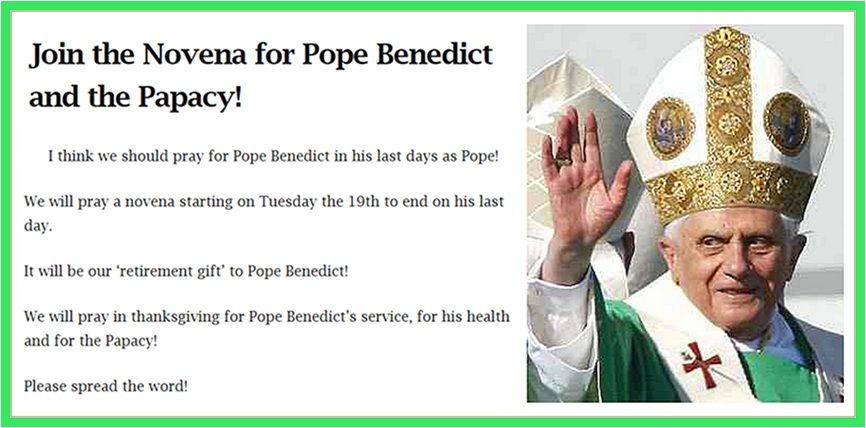
Prayers for today:
Dear Lord, Your servant Benedict
has given his life for the Church and for You.
As he now steps down from leadership,
please protect his health as he grows older
so that he can continue to serve You in prayer.
[Say your intentions and personal petitions for the Pope]
Let us pray for Benedict, the Pope.
May the Lord preserve him,
give him a long life,
make him blessed upon the earth,
and not hand him over
to the power of his enemies.
May Your hand be upon Your holy servant.
And upon Your son, whom You have anointed.
Closing: The Prayer of St. Benedict
Gracious and holy Father,
please give to our Pope and
to us the faithful:
intellect to understand You;
reason to discern You;
diligence to seek You;
wisdom to find You;
a spirit to know You;
a heart to meditate upon You;
ears to hear You;
eyes to see You;
a tongue to proclaim You;
a way of life pleasing to You;
patience to wait for You;
and perseverance to look for You.
Grant Your servant the Pope
and us the faithful:
A perfect end,
Your holy presence.
A blessed resurrection,
And life everlasting.
Our Father...
Hail Mary...
Glory Be...
[Modificato da TERESA BENEDETTA 22/02/2013 21:58] |
| |
 22/02/2013 22:33 22/02/2013 22:33 |
|
| | | OFFLINE | | Post: 26.346
Post: 8.838 | Registrato il: 28/08/2005
Registrato il: 20/01/2009 | Administratore | Utente Master | |
|

 Benedict makes minor changes
Benedict makes minor changes
in the next Pope's installation rite
and makes a few new appointments
By NICOLE WINFIELD
VATICAN CITY, February 22, 2013 (AP) — Pope Benedict XVI is clearing the decks of his pontificate, tweaking the rules of the Conclave, finessing the religious rites used to launch the next papacy and making some eyebrow-raising final appointments before he retires next week.
[The 'eyebrow-raising' is an allusion to the appointment of Mons. Ettore Balestrero, considered the right-hand man of Cardinal Tarcisio Bertone at the Secretariat of State, to be the apostolic nuncio to Colombia. Obviously any papal appointments announced by the Vatican this week while the Pope is on retreat were not decided in the past few days, but part of the scheduled appointments intended by the Pope even if he had not decided to retire.
However, the timing of the announcement is unfortunate because yesterday's Repubblica tabloid account - from which the media that picked up the story have concluded that the most 'significant' part of the cardinals' inquiry into Vatileaks is the supposed existence of a secular gay lobby intent on blackmailing members of the Curia who are vulnerable. Not all the MSM have run with the story, so far, but the usual malicious minds are buying the Repubblica narrative that the homosexual angle pushed Benedict XVI into deciding to retire.
In another part of the story, Mons. Balestrero is named as among the officials interviewed by the cardinals about financial matters in the Vatican, given that he led the Vatican delegation dealing with Moneyval on negotiations to get the Holy See onto the 'white list' of financial establishments that pass international muster. From that mention of Balestrero, who happens to be young and good-looking, to connecting him with the alleged gay plot, is a despicable leap.
In the absence of any 'front runner' in the Conclave so far, media are understandably antsy to get any juicy Vatican story going, and I am very much afraid that the last six days of Benedict XVI's Pontificate will be smeared all over with a new 'scandal', which was the objective all along, I believe, of Repubblica's prize piece of yellow journalism yesterday. ]
The Vatican newspaper L'Osservatore Romano said in editions published late Friday that Benedict had signed a decree earlier in the week making some changes to the papal installation Mass, separating out the actual rite of installation from the liturgy itself.
[This is entirely consistent with what he did earlier to the rites of ordination and the even more elaborate multi-stage rite of inatalling new cardinals, separating the sacrament of ordination (and the cardinal 'installation' rite, for want of a better word) from the Eucharistic liturgy. Much earlier in his Pontificate, he separated the venerable Vigil rites on Easter and on Christmas from the Vigil Masses themselves, so that they now take place before the Mass, in preparation for it, rather than 'interrupting' the canon.]
He is also studying the text of a separate document governing the rules of the conclave, though it's not known if it will address the thorny issue of whether the election can begin earlier than March 15, by some interpretations the earliest the vote can start under the current rules.
[I do believe that the main purpose of any such motu proprio is to authorize the cardinals, just for this singular circumstance, to set a Conclave starting date earlier than the 15-20 days after the Chair of Peter is vacated, as provided for in the 1996 Apostolic Constitution that spells out the rules for the sede vacante and the Conclave. The statutory period was formulated for the usual cause of a sede vacante, i.e., a Pope dies, as it would allow the Church to observe a nine-day novena of suffrage Masses, even as it gives time for cardinals who live abroad to arrive in Rome. But even if the Pope authorizes the College of Cardinals - who constitute the governing body of the Church during the interregnum - to set an earlier date, it is up to the cardinals to vote whether they want to start the Conclave earlier than March 15, and they are expected to do this at their first General Congregation which will probably take place shortly after February 28.]
And on Friday, the Vatican announced Benedict had transferred a top official in the secretariat of state, Monsignor Ettore Balestrero, to Colombia — an appointment that came amid swirling media speculation about the contents of a confidential report into the Vatican's leaks scandal.
Italian newspapers have been rife for days with unsourced reports about the contents of the secret dossier that three cardinals prepared for Benedict after investigating the origins of the leaks. The scandal erupted last year after papers taken from the Pope's desk were published in a blockbuster book. The pope's butler was convicted in October of aggravated theft, and later pardoned.
The Vatican has refused to comment on the reports, which have claimed the contents of the dossier, delivered to Benedict in December, were a factor in his decision to resign. Benedict himself has said he simply no longer has the "strength of mind and body" to carry on.
[Specifically, Repubblica's shoddy story - it's almost worth wasting the time to translate it just to show how awful it is by any criterion - claims the decision to resign was taken on December 17, mark the date!, when the three cardinals supposedly submitted their final report to the Pope - the day, the writer claims with as much melodrama as she could muster, that the word 'homosexuality' was ever mentioned in the papal apartment! Really? what does she know! And yet, the entire tale of innuendo and conjecture is told in omniscient mode. But the cardinals' report was submitted much earlier, in late summer, before Paolo Gabriele's trial even went underway.
One gathers from what Georg Ratzinger has said that the Pope may have informed his brother of his decision some time earlier than that - not over the telephone but sitting together one evening - when Georg Ratzinger spent August in Castel Gandolfo with him, as he has done every summer since 2005. Or he could have told his brother during the latter's New Year visit to the Vatican, but that would put it before the March trip to Mexico and Cuba, during which, we now learn, he had another nighttime fall or stumble that could have had more serious consequences than just a superficial head wound. Even a major fracture, of a leg bone or the hip, is potentially lethal for older people.]
The Vatican spokesman, the Rev. Federico Lombardi, has indicated that Benedict would meet with the three cardinals before stepping down Feb. 28, in one of his final private audiences. [It is said he may want them to provide the cardinals with a copy of their report before they meet in conclave. Another sign of Benedict's wisdom and foresight. Someone has to avail of the findings and insights. But since it won't be him, why not the College of Cardinals, one of whom will be Pope? Could there be a grander act of collegiality? To give them an exact idea of how things are run in the Roman Curia, not just rumor or conjecture, but based on the observations and opinions of a wide variety of Curial representatives. One might even think Benedict did not order the inquiry for his own benefit, because at the time he ordered it in June, after Gabriele's arrest, he was already laying the groundwork for his renunciation. He must have wanted to leave behind something concrete and practical that his successor could use when determining what to do with the Curia. Or to be more precise, with the Curial bureaucracy who are responsible for making it run, so they could either oil the machinery or put a spoke in its gears, as they please.
Given the rivalries, turf battles and allegations of corruption in the Vatican exposed by the leaks themselves, there is some speculation that cardinals entering the conclave might want to know the contents of the dossier before choosing a new Pope. .. ['Might want to know'? Of course they would want to know. They can't forever be relying only on the gossip and surmise peddled by the media and the professional Vatican bashers. At least, this report comes from three respected octogenarian cardinals who have no turf to defend or interests to protect... Also remarkable in that sentence is the use of the phrase 'allegations of corruption' by AP. That surprised me, but it's what MSM has never done before, gleefully attributing (nay, accusing!) unqualified 'evil and corruption' in the Vatican without citing one example that they could well investigate and expose if there really were something worth anyone's while. All they needed as 'proof' were the dicta of Vigano and Gabriele ('They said so - it must be true!'), whom they have since canonized.]
Balestrero was head of the Holy See's delegation to the Council of Europe's Moneyval committee, which evaluated the Vatican's anti-money laundering and anti-terror financing measures. He has had a hand in the efforts by the Vatican bank to be more transparent and is close to Benedict's No. 2, the Vatican secretary of state Cardinal Tarcisio Bertone.
The Vatican submitted itself to Moneyval's evaluation in a bid to improve its reputation in the financial world.
The Vatican passed the test on the first try in August, and Moneyval said it had made great progress in a short amount of time. But the Holy See received poor or failing grades for its financial watchdog agency and its bank, long the source of some of the Vatican's more storied scandals.
Some of the documents leaked in the midst of the Vatileaks scandal concerned differences of opinion about the level of financial transparency the Holy See should provide about the bank, the Institute for Religious Works. However, Balestrero himself wasn't named in any significant way in the leaks.
The Vatican is now working to comply with Moneyval's recommendations before the next round of evaluation. Lombardi said the lengthy Moneyval process would simply be handled by someone else now that Balestrero is leaving.
Lombardi said Balestrero's transfer had been months in the works, was a clear promotion and had nothing to do with what the Vatican considers baseless reporting.
Lombardi noted that the nunciature in Bogota is one of the most important in Latin America, with the headquarters for the Latin American bishops' conference as well as the regional organization for religious orders, and is usually headed by someone who has had experience as a nuncio in at least two other postings.
"The procedure for this nomination was started some time ago, as evidenced by the fact that the agreement (with Colombia) has already been reached," Lombardi told The Associated Press. "It was started well before the Pope's resignation, so it's completely unfounded to link it to the news articles in recent days." [It should not even have to be explained. It obviously was not decided by the Pope yesterday, reacting to the Repubblica hack job! When he made the decision, he might have taken into account that after he ceases to be Pope, there are some promising younger people who must be protected so that their way forward is not suppressed under a new dispensation, just as Benedict has taken steps to protect Georg Gaenswein. Balestrero, as a top aide to Cardinal Bertone, could conceivably be hexed by older, more experienced careerists in the Secretariat of State after Bertone is gone, so give him an important and relatively autonomous assignment now.]
Asked if the transfer had anything to do with the broader Vatileaks investigation, Lombardi said he was declining comment in line with the Vatican's decision not to confirm or deny any specifics of the investigation.
Spanish Cardinal Julian Herranz, the Opus Dei canon lawyer who headed the cardinal's commission, has spoken in vague terms about the report and the well-known divisions within the Vatican Curia that were exposed by the leaks.
"Certainly, it has been said that this was a hypothesis behind the pope's resignation, but I think we need to respect his conscience," Herranz told Radio24 last week. "Certainly, there are divisions and there have always been divisions, as well as clashes along ideological lines. These aren't new, but yes, they have a weight." [Why Herranz had to say that at all is most unfortunate, but all those who now buy the line that 'Gay blackmail forced Pope to resign', as one headline put it = so the unwitting who only sees the headline would think the Pope himself was the blackmail victim - used it today to reinforce the Repubblica hypothesis.]
Pope Benedict modifies ritual
for next Pope’s inauguration
by Cindy Wooden

VATICAN CITY, Feb. 22, 2013 (CNS) — Pope Benedict XVI has ordered several changes to the Mass and rituals that will mark the inauguration of the next Pontificate.
Rites and gestures that are not strictly sacramental will take place either before the Mass or in a ceremony not involving Mass, Msgr. Guido Marini, master of papal liturgical ceremonies, told the Vatican newspaper Feb. 22.
One of the most visual changes, he said, would be the restoration of the public “act of obedience” in which each cardinal present at the Pope’s inaugural Mass comes forward and offers his allegiance.
When Pope Benedict celebrated his inaugural Mass in 2005, 12 people were chosen to represent all Catholics: three cardinals, a bishop, a diocesan priest, a transitional deacon, a male religious, a female religious, a married couple and a young man and a young woman recently confirmed.
Msgr. Marini said Pope Benedict personally approved the changes Feb. 18; they include offering a wider choice of traditional Mass prayers in polyphony and chant, rather than the new musical repertoire composed for the 2005 book.
After having personally experienced the liturgical rites prepared by Msgr. (Guido) Marini’s predecessor[Mons. Piero Marini, at the time] — and approved by Pope Benedict immediately after his election — the Pope suggested “a few changes aimed at improving the text” of the rites for the beginning of a pontificate, formally known as the “Ordo Rituum pro Ministerii Petrini Initio Romae Episcopi.”
The changes, Msgr. Marini said, “follow in the line of the modifications made in papal liturgies” over the course of Pope Benedict’s papacy.
The previous edition of the ritual handbook also called for the next Pope to visit the basilicas of St. Paul Outside the Walls and St. Mary Major within two or three weeks of his installation.
The new book, Msgr. Marini said, leaves it up to the next Pope to decide “when it would be most opportune, even at some distance from his election, and under what form he judges best, whether it be a Mass, a celebration of the Liturgy of the Hours, or a particular liturgical act” like the one found in the 2005 ritual book.
In an email response to questions, Msgr. Marini told Catholic News Service that no significant modifications had been made to the “Ordo rituum conclavis” itself, the book of rituals, Masses and prayers that accompany the conclave to elect a new Pope.
___ [Modificato da TERESA BENEDETTA 27/02/2013 12:26] |
| |
 23/02/2013 16:21 23/02/2013 16:21 |
|
| | | OFFLINE | | Post: 26.347
Post: 8.839 | Registrato il: 28/08/2005
Registrato il: 20/01/2009 | Administratore | Utente Master | |
|
 So I was not at all over-reacting in my outrage at Repubblica's tabloid trash, because the back story to it - quickly revealed - shows how Repubblica also used an equally despicable journalistic trick to launch the offensive, namely, virtual plagiarism of someone else's enterprising work and embroidering on it to suit their malevolent aims. (Sorry for the delayed post, but yesterday was Friday, my enforced 'away day' from the Forum).
So I was not at all over-reacting in my outrage at Repubblica's tabloid trash, because the back story to it - quickly revealed - shows how Repubblica also used an equally despicable journalistic trick to launch the offensive, namely, virtual plagiarism of someone else's enterprising work and embroidering on it to suit their malevolent aims. (Sorry for the delayed post, but yesterday was Friday, my enforced 'away day' from the Forum).
 You don't have to know Italian to get the sense of the headline:
ATTACK AGAINST THE POPE:
You don't have to know Italian to get the sense of the headline:
ATTACK AGAINST THE POPE:
'My scoop was distorted
by Repubblica to strike
at Benedict'
Interview with Ignazio Ingrao
By Pietro Vernizzi
February 22, 2013
A 'scoop' was instrumentalized to hit at Benedict XVI. The article in La Repubblica published on February 21 with the title "Sex and careerism, the blackmails at the Vatican behind the resignation of Benedict XVI" was not based on an original investigative work as the item implies, but was a rehash of ample excerpts from an article in Panorama (Italian newsweekly) which went on sale yesterday but which had been provided to the media earlier. [News media publicize themselves to other media from time to time to call attention to a particular issue or initiative... But I must note first that the word 'scoop' is used here improperly. A scoop is an exclusive news story acquired by a journalist alone. This one is not a scoop but an 'enterprise story', developed by a specific journalist following a specific line of inquiry that has not been used by his colleagues.]
Speaking out is Panorama's Vaticanista, Ignazio Ingrao, who says "it certainly cannot be said that the report on the Curia [by the three cardinals] was the only reason for the resignation of Benedict XVI... who has a vast knowledge of the realities of the Church in all the five continents".
Up to what point would you say the Repubblica article is faithful to reality?
It is an article that picks up generously from the article published in Panorama on the same day, and which we had provided to the news agencies the day before. The Repubblica article, signed by Concita De Gregorio, was therefore inspired by us, although it goes beyond the work that I did. De Gregorio reused much of what we had provided to the agencies but added stuff of her own.
The Panorama article is more balanced compared to hers, because I gave a less factious reading of things. [He uses the word 'realta' which is a rather ample Italian generic term for unspecified 'things'.]
What I did was to seek to reconstruct the method followed by Cardinals Herranz, Tomko and De Giorgi, who carried out their task very meticulously, inquiring into the overall situation of the Curia and interviewing numerous persons for this purpose.
Benedict XVI resigned because of the contents of their report, or for a number of reasons all together? [Why the interviewer should even frame the question this way is beyond me. I realize he's trying to put questions that the ordinary person might ask, but 1) why ask Ingrao, who is just another newsman and who surely cannot speak for Benedict, any more than you and I! And 2) Worse, it reflects the general non-acceptance and skepticism in more circles than one had expected of the Pope's one and only reason for resigning - that the afflictions of age no longer allow him to serve the Church as well as he would want to and as she needs to be.]
We cannot say that Benedict XVI has resigned only because of this. He did it because it was a decision that had matured over time in his own thinking for a variety of reasons. [NOT A VARIETY! Only his failing physical abilities - because certainly, an 86-year-old who can deliver the 45-minute off-the-cuff but print-ready lecture on Vatican II to the clergy of Rome last week cannot be said to have failing mental or psychological qualities in any way!]
Of course, governance through the Curia in the current situation is an important element [The situation is no worse than it has been for the past 50 years!] because the governance of the Church depends on the Curia. But it is true that in the overall concerns of the College of Cardinals and the Pope, this is just a piece of the problem.
In what way?
Benedict XVI has a far wider view of the problems of the Church, of the challenges and difficulties she faces in the world, in all the continents, from the Americas to Europe and Italy itself.
Joseph Ratzinger is aware of the internal difficulties of managing the Vatican 'machinery', but more than that, of the urgency that there is one person who can take charge with all his energies of the great problems that the Church has in the world.
So I would not wish anyone to think that everything about the Church revolves around the Curia. It is an important element but not the only one. Joseph Ratzinger himself had been in the Curia since 1982. long before he became Pope.
Do you think that the cardinals' report contained anything that he did not already know?
He would certainly have known of some episodes. In the past eight years, he has continually reiterated, asked and called on everyone in the Church to overcome careerism, divisions and fighting for power. He had expected his calls to be heard.
On the other hand, even when he was in the Curia, Joseph Ratzinger was always outside the mainstream, outside relationships of alignment, outside certain circles. [He chose to be, and rightly so.]
Vatileaks offered him the pretext to order an inquiry into the Curia, which was much more wide-ranging than just examining how and why there have been so many leaks from the Vatican - the cardinals appear to have looked at all aspects of the Curial machinery. And they seem to have found out that even in the circle of the Pope's closest collaborators, his appeals had not been heard enough. [Since that circle is fairly small - his secretaries, Cardinal Bertone and his top aides at the Secretariat of State - the statement casts aspersion over all of them, such as Mons. Balestrero being all but identified directly as one of the possible targets of blackmail by the 'gay lobby'.]
But Benedict XVI, with his waning strength, has been unable to effect the necessary changes in the Curia and has to entrust it now to his successor.
What will be the effect of the cardinals' report on the coming Conclave?
It will be the 'stone guest' at the Conclave. [The reference is to the statue of a murdered commandant who haunts the final hours of Don Giovanni in the opera by Mozart.]
The three cardinals who carried out this very meticulous investigation will not be part of the Conclave (they are all over 80), but the conclusions they draw in their report will weigh on the cardinals. In the course of their investigation, they uncovered a series of connections, relationships and situations, and all the electors will know that the next Pope will have to take this report in hand and make decisions accordingly.
So the influence of this report will be silent, but it has to influence how the Conclave goes. The three cardinals may not be able to tell the electors before the Conclave exactly what they wrote but they can certainly orient their colleagues what to look after, given the situation and relationships they describe. [So, all the better if Benedict XVI does decide to provide the report to the cardinals. And if they blab about it, then fine - let the world know.]
I chose to translate this interview with Ingrao rather than his Panorama article - which I have not yet seen - because he himself has not been above the journalism of innuendo and far-fetched conclusions that MSM loves to indulge in, and I suspect his Panorama article could be just as underhanded in its presentation as Repubblica's... In any case, I am grateful that he has publicly called the Repubblica article 'a distortion to strike at the Pope', but the damage has been done. Of course, the same 'distortion' might have resulted even if Repubblica had never come out with a rival article and the news media had reported only on Ingrao's article. As it is, I doubt anyone in MSM will bother to report now what Ingrao wrote.]
The first idea I had that Ingrao had anything to do with the Repubblica article at all came from a PewSitter headline that reads "Second Source Backs La Repubblica Report on Homosexual Alliance and Blackmail", which linked to a Catholid World News report on Fr. Lombardi's announcement that the Vatican will not comment in any way on any statements made regarding the content of the cardinals' report to the Pope.
But the last paragraph of the item reads, "Ignazio Ingrao, who covers the Vatican for Panorama magazine, backed the report by La Repubblica. He said that the cardinals’ commission disclosed 'a network of alliances and acts of blackmail of homosexual nature in several areas of the Curia'." Already, Ingrao's role itself in this story has been distorted in this report, as if he were saying "Me, too", instead of having originated the hypothesis that has now been instantly raised to the level of secular Scripture cast in stone on the Sinai of the media god Untruth.]
Even worse, the PewSitter headline assumes the Repubblica 'report' to be genuine news, rather than the illwill-driven interpretation by a Vatican-hating newspaper of Ingrao's conjectures about the cardinals' report, not based on any knowledge of the report at all, as he admits, but on his 'reconstructing' the method of inquiry followed by the cardinals, having some idea of the persons they interrogated and drawing his own conclusions therefrom.
So we also have a hitherto respectable blog like Rorate caeli irresponsibly, almost gleefully, touting the poisonous Di Gregorio article as "La Repubblica's summary of the Herranz-Tomko-DiGiorgi report" and "the Guardian's reasonable summary of the report". So, they have elevated Repubblica's tabloid trash into a summary of the cardinals' report, which from all accounts, only they (and presumably at least one secretary who would have typed up their report) and the Pope himself know about.
Repubblica has now totally succeeded in sliming the last days of this Pontificate with a disgusting deluge of odious speculation. I can already see the MSM newsweeklies summing it up as "Benedict exits dogged by salacious speculation of gay blackmail" (Except, of course they would not call it speculation but 'reports').
The unabashed malice and deliberate dishonesty in the MSM treatment of Benedict XVI are just too relentless to dismiss with the Christian "Forgive them for they know what they do" - MSM know exactly what they are doing but they also have the sociopath mentality of not caring about the consequences of their actions as long as they achieve their aim.
P.S. And I haven't even referred to a lengthy Reuters 'analysis' yesterday that reverts to Benedict-hating mode by portraying him as 'isolated' and quoting any number of naturally unnamed 'Vatican officials' to give some credence to the 'isolation' hypothesis, like someone saying "He really has no friends at all" as if that were the literal truth...
Or an editorial in Le Figaro by Jean Guenois that the OR even reproduces, which I had thought promising, because it starts out by saying that Benedict XVI's best encyclical may be something he has not written by pen but by his life - an encyclical on humility.
But I gave up translating after the first paragraph because it quickly devolved into an unfavorable comparison with John Paul II and a litany of all of Benedict's so-called 'blunders and gaffes' which Guenois presents as though that were all his Pontificate consisted of. And yet, from Regensburg to Vatileaks, none of these too-often cited criticism has any intrinsic merit at all as the 'fault' of Joseph Ratzinger - each was imposed on him as a burden of blame and disproportionate censure by others through the proactive agency of the MSM.
Or the nauseating over-the-top melodramatic account by "Dr" Robert Moynihan in his "Moynihan Letters" about how he learned of the Repubblica story which he instantly considers gospel truth for all its lack of that indispensable essential of journalistic reporting - facts, not conjecture. He breathlessly chronicles how the writer for the Irish Times, surely not the most objective chronicler of this Papacy, pounded away at his account for Irish readers of what Repubblica says. And worse...
From someone who has often professed - a profession well illustrated by articles in his magazine, Inside the Vatican - to be an admirer of Benedict XI, this absolutely indiscriminate and a-critical acceptance of unfounded reporting and unsubstantiated allegations (and the alacrity with which Moynihan swears by it) is just appalling, to say the least (as I am incapable of finding a word strong enough to describe such lack of judgment). Is that the behavior of a friend, 'Dr. Moynihan'? {I always thought his use of the title 'Dr' - for PhD - in his bylines was a pompous affectation, but there you are!]
[Modificato da TERESA BENEDETTA 23/02/2013 17:13] |
| |
 23/02/2013 18:18 23/02/2013 18:18 |
|
| | | OFFLINE | | Post: 26.348
Post: 8.840 | Registrato il: 28/08/2005
Registrato il: 20/01/2009 | Administratore | Utente Master | |
|

 Saturday, February 23, First Week of Lent
Saturday, February 23, First Week of Lent
 ST. POLYCARPUS (Smyrna, ca 69-156), BISHOP AND MARTYR
ST. POLYCARPUS (Smyrna, ca 69-156), BISHOP AND MARTYR
He was a disciple of St. John, who consecrated him Bishop of Smyrna (now Izmir, present Turkey), and a friend of St. Ignatius
of Antioch. With St. Pope Clement of Rome (the first Successor of Peter) and Ignatius, he is considered one of the three
Apostolic Fathers of the Church. As s 'second-generation' Christian, his testimony was critical for affirming orthodox
teaching in the face of many conflicting interpretations of what Jesus said. At age 86, after he refused to burn
incense to the Roman emperor (Marcus Aurelius), a bloodthirsty crowd tried to burn him at the stake without success -
they finally killed him with a dagger. After St. Stephen's, the report of his martyrdom was the earliest reliable
account about the death of an early Christian martyr. A letter he wrote to the Christians of Philippi survives.
Readings for today's Mass: www.usccb.org/bible/readings/022313.cfm
AT THE VATICAN TODAY
The Holy Father and members of the Roman Curia ended their weeklong spiritual exercises for Lent this morning.
Benedict XVI's last words as he ended his last Lenten retreat as Pope were both awesome as he generally is on
such occasions, as well as infinitely moving because of his farewell.
Later he met with
- Cardinal Gianfranco Ravasi, President of the Pontifical Council for Culture, who preached the Lenten exercises.
The Vatican also released the text of Benedict XVI's formal letter of thanks to the Cardinal.
- H.E. the Hon. Giorgio Napolitano, President of the Republic of Italy, and his spouse.
The Secretariat of State released a statement commenting on the fallout from the speculations about the cardinals' report to Benedict XVI in the wake of Vatileaks. Here is what the Vatican calls its 'working translation' in English:
Communiqué of the Secretariat of State
The freedom of the College of Cardinals, which is responsible for providing under the law for the election of the Roman Pontiff, has always been strongly defended by the Holy See, as a guarantee of a choice was based on evaluations addressed solely for the good of the Church.
Through the course of centuries, Cardinals have had to face many forms of pressure exerted upon individual electors or on the College of Cardinals. Such pressures had as their goal to condition the decisions, following a political or worldly logic.
If in the past, the so-called powers, i.e., States, exerted pressures on the election of the Pope, today there is an attempt to do this through public opinion that is often based on judgements that typically do not capture the spiritual aspect of the moment that the Church is living.
It is deplorable that as we draw closer to the beginning of the Conclave when the Cardinal electors will be held, in conscience and before God, to freely indicate their choice, that there is widespread dissemination of often unverified, unverifiable or completely false news stories that cause serious damage to persons and institutions.
At this time more than ever, may Catholics focus on what is essential: Praying for Pope Benedict, praying that the Holy Spirit may enlighten the College of Cardinals, praying for the future Pope, confident that the fate of the barque of Peter is in the hands of God.
Thanks for saying "Pray for Pope Benedict", but I don't know that it was at all necessary to issue a statement warning against pre-Conclave 'pressures' exerted on the cardinal electors, because one must assume such pressures would not and should not count with the individual cardinals and the cardinal electors in general.
All the unsavory speculation now swirling about homosexuals in the Curia - that seems to be the current item of unseemly prurient interest - pressures the cardinal electors into exactly what? Not to elect a homosexual as Pope? Since there are no acknowledged front-runners at this time, the speculation neither serves nor disserves any particular candidate or any potentially coagulating groups behind a specific candidate. This was not about 'pressuring' the cardinals at all. It was about a last-minute 'turn of the screw' to squeeze out what blood they can from Benedict XVI's lily-whiteness.
If SecState had to issue a statement at all, it should have been to say simply, "Any reports on the alleged contents of the confidential report submitted by Cardinals Herranz, Tomko and De Giorgi to the Holy Father must be considered as nothing more than speculation, because the report has been kept strictly confidential."
And it could have been a golden opportunity, the last (and at last!, but alas, missed again), to stand up for Pope Benedict XVI, who, at this point, is the only victim of this 11th-hour manufactured 'scandal' (other than the truth, of course). He is the victim, not just because the speculation inevitably associates these new distasteful insinuations with his Pontificate, but it also fuels the unwarranted, uncharitable and irrational skepticism questioning the Pope's given - and painfully obvious - reason for stepping down.
Why, all of a sudden - just because this has not happened with any previous Pope - is physical inability to live up to the demands of a task not reason enough for anyone to step down, whether he is Pope or street cleaner? Especially when he is 86, clearly showing the relentlessly inevitable toll that age takes on the human body, yet sworn to carry out the uniquely gargantuan task of Pope?
As usual, however, the Secretariat of State completely misses that obvious point. It was their last chance to come to the defense of the sacrificial lamb and scapegoat that Benedict XVI has represented for them all these years, and once again they failed. Shame on them!
One year ago today...
Benedict XVI had his annual meeting with the priests of Rome, his Diocese, and addressed them
in a lectio divina on Ephesians 4,1-14, during which he warned the clergy once more against vainglory.
[Who better than he to say this, especially in the light of his renunciation less than a year later?]
[Modificato da TERESA BENEDETTA 23/02/2013 23:26] |
| |
 23/02/2013 19:54 23/02/2013 19:54 |
|
| | | OFFLINE | | Post: 26.349
Post: 8.841 | Registrato il: 28/08/2005
Registrato il: 20/01/2009 | Administratore | Utente Master | |
|
 His last Lenten retreat as Pope:
His last Lenten retreat as Pope:
'To believe is to touch God by the hand
in the darkness of the world'
Translated from

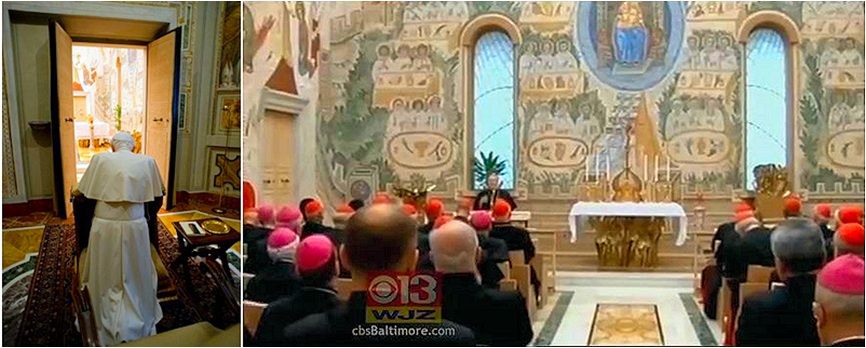
At 9:00 a.m. today, the Lenten spiritual exercises of the Roman Curia in the presence of the Holy Father came to an end at the Redemptoris Mater chapel of the Apostolic Residence, with the chanting of Lauds and the final meditation.
This year, the meditations were composed by Cardinal Gianfranco Ravasi, president of the Pontifical Council for Culture, on the theme, "Ars orandi. ars credendi: The face of God and the face of man in the prayers of the Psalms".
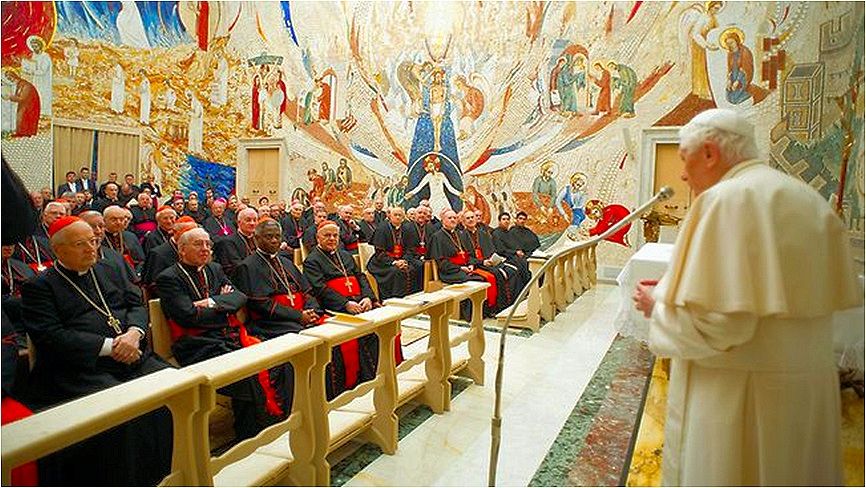
At the end of the final meditation, the Holy Father addressed the congregation:
Dear Brothers,
Dear friends:
At the end of this week which has been so spiritually rich, there is one word left to say: Thank you.
Thanks to you all for this praying community of listening, who have accompanied me this week.
Thanks above all to you, Eminence, for these beautiful 'walks' in the universe of faith, the universe of the Psalms.
We have been fascinated by the richness, the profundity, the Beauty of this universe of faith, and we are grateful that the Word of God has spoken to us once more in a new way and with new power.
'The art of believing as the art of praying' was the theme. It occurred to me that the medieval theologians translated the word 'logos' not only as 'verbum' but also as 'ars' - in which 'verbum' and 'ars' are interchangeable. [Art, in the general sense, means a way of doing things, to which the connotations of skill and beauty are added when the word is used in its usual sense.]
For the medieval theologians, it was only in both concepts that the entire significance of the word 'logos' could be shown.
Logos is not just mathematical reasoning - it has a heart, because Logos is also love. Truth is beautiful, truth and beauty go together - beauty is the seal of truth.
In addition, starting from the Psalms and our experience of everyday, you strongly underscored that the very beauty of the sixth day [when God created man] - expressed by the Creator has been perennially contradicted in this world by evil, by suffering, by corruption.
It is as if Evil were permanently intent on spoiling creation, to contradict God and to render his beauty and his truth unrecognizable.
In a world so marked by evil, Logos - which is eternal Beauty and eternal Ars - must seem to be like the caput cruentatum [from the first words of a medieval Latin hymn celebrating the wounds on the Body of Christ, "O Sacred Head, now wounded", later set to chorale music by Bach, 'O Haupt voll Blut und Wunden'] - the incarnate Son, the incarnate Logos, wounded with a crown of thorns.
But it is precisely in this suffering figure of the Son of God that we begin to see the most profound beauty of our Creator and Redeemer. And in the silence of the 'dark night' [a reference to St. John of the Cross's 'dark night of the soul'], that we are able still to listen to his Word.
To believe is nothing other than to touch the hand of God in the obscurity of the world, to listen to his Word in silence, and to see Love.
Eminence, thank you for everything. Let us take more 'walks' in this mysterious universe of faith so that we may be ever more capable of praying, of announcing, of being witnesses to the truth, which is beautiful, which is Love.
Finally, dear friends, I wish to thank you all, not only for this week, but for these eight years during which you have carried with me - with great competence, affection, love and faith - the weight of the Petrine ministry.
This gratitude will remain with me, and even as the 'exterior' and 'visible' communion, as Cardinal Ravasi described it, is coming to an end, the spiritual closeness will live on, a profound communion in prayer.
With this certainty, let us move forward, certain of God's victory, certain of the truth of beauty and of love.
Thank you to everyone.
And thank you, again and again and for always, beloved Benedict, for your ability to uplift the soul, and to cast such pearls of 'the true, the good and the beautiful' in a spontaneous way - truly ars in both senses of the word - that is in itself true, good and beautiful. After February 28, how can we not miss you and the 'exterior, visible communion' we have had with you these past eight years?
[Modificato da TERESA BENEDETTA 24/02/2013 12:50] |
| |
 23/02/2013 22:05 23/02/2013 22:05 |
|
| | | OFFLINE | | Post: 26.350
Post: 8.842 | Registrato il: 28/08/2005
Registrato il: 20/01/2009 | Administratore | Utente Master | |
|
 Finally, a sensible voice speaks out on a controversy that has exercised the media - secular and Catholic alike - in the past few weeks and might have made as big a media splash as the Pope's remarks on condoms, were it not that everyone is more occupied now with the end of Benedict's Pontificate and looking to the new one...
On the German bishops’ decision to allow
Finally, a sensible voice speaks out on a controversy that has exercised the media - secular and Catholic alike - in the past few weeks and might have made as big a media splash as the Pope's remarks on condoms, were it not that everyone is more occupied now with the end of Benedict's Pontificate and looking to the new one...
On the German bishops’ decision to allow
contraceptive pill for rape victims
The Church has allowed it for 50 years in Africa
by Alessandro Speciale

February 23, 2013
The German bishops’ breakthrough decision on emergency contraception for rape victims has sparked heated debates and controversies in Germany and abroad.
It all began with the case of a girl who was raped and denied the morning-after pill in two Catholic hospitals in Cologne. The city’s archbishop, Cardinal Joachim Meisner, was asked to intervene, and after much reflection and various consultations, he agreed -with specific reservations - that an appropriate contraceptive pill should be made available in Catholic hospitals to victims of rape. German bishops supported his decision this week.
The President of the Pontifical Academy for Life, Mgr. Ignacio Carrasco de Paula, spoke to Vatican Insider about this at the end of the Academy’s plenary assembly this week:
Monsignor, what are we really talking about here?
German bishops have decided to back their colleague, Cardinal Meisner, who has handed down a regulation to be implemented in Catholic hospitals in his diocese. It is exemplary because it reiterates what the Catholic Church has been proposing for the past 50 years, but it is being misrepresented.
How?
Because journalistic language is different from theological or clinical language. The “morning-after pill” is a journalistic, not a medical term. It does not appear in any prescription pads or prescriptions. This is why Cardinal Meisner stressed that the term “morning-after pill” can refer to a number of things and urged people not to use it indiscriminately.
All he did was tell doctors which criteria to follow: that it is acceptable for women who have been raped to receive medication that has an active contraceptive ingredient. He specifically said abortive medication should not be made available.
Why is contraceptive medication acceptable in rape cases but not in other circumstances?
The criteria the Church follows in its rejection of contraceptives can be found in Paul VI's encyclical, Humanae Vitae, and even before that, in Casti Connubii. In both cases, contraception is considered in the light of marital intercourse which consolidates a couple’s bond, which has a procreational purpose.
Rape, on the other hand, is a sexual act committed in violence [and in the usual cases, not between husband and wife]. In this case, the moral implications of contraception are lost. A violent act cannot be considered a demonstration of openness to life.
Why are people, including many Catholics, unable to grasp this principle and why is this issue so controversial?
These are extreme cases. People are more used to hearing about common cases rather than exceptional ones. But after what happened in the Congo during the war [the early years of the still ongoing civil conflict), this regulation has been implemented in Catholic hospitals for fifty years. Some Catholic hospitals like the ones in Cologne are obviously not aware of it.
[Nor was Cardinal Meisner, apparently. But one has to argue in his behalf that he sought nonetheless to be more informed about the mechanism of action of so-called 'morning after' pills. He has been criticized because the experts he approached work for a company that sells contraceptive pills, i.e., would be more likely to give him the answer he wants to hear rather than objective scientific facts.]
Critics say this type of medication can cause an abortion, albeit unintentionally, and that this is not a risk we can afford to take. What are your thoughts on this?
The Church needs to shape people’s consciences. What Church teaching says in this case is: in cases of rape all possible action must be taken to prevent a pregnancy but not to interrupt it. Whether a given medicine is classed as a contraceptive or abortion-inducing medication, is up to doctors and scientists, not the Church.
This question needs to be carefully analysed - a generic response that applies to everyone is not enough. It is therefore absurd that there is a law that requires any hospital to dispense just any pill to a woman who says she has been raped. The decision must be made by a doctor, based on his or her knowledge and experience. Too often, however, the pill is just handed out, without any interest being shown in the person as an individual.
[And there is still the physiological fact, as I feel I need to point out, that sometimes, contraception against a rape pregnancy may not even be necessary - if the rape occurs when a woman is well outside her monthly fertile period, in which case there is no ovulated egg available to be fertilized by any sperm. Even in women, especially girls, who are not familiar with their physiology, a simple blood test shortly after the rape will indicate whether they are close to ovulating, have just ovulated, or are safely outside the fertile period and do not need contraception at all.
The other consideration is that the same active ingredient in these pills can be both contraceptive and abortifacient, so the timing of when it is administered with respect to the rape is also a factor. If it is administered within 12 hours from the rape, it will prevent conception, but after that, if the victim's egg has been fertilized by the rapist's sperm, it becomes abortifacient, either by 'killing' the embryo directly, or preventing it from being able to implant itself on the wall of the uterus, so it will simply die out.]
 |
| |
 23/02/2013 23:19 23/02/2013 23:19 |
|
| | | OFFLINE | | Post: 26.351
Post: 8.843 | Registrato il: 28/08/2005
Registrato il: 20/01/2009 | Administratore | Utente Master | |
|
 Father Z, who has used the special banner above since the announcement, has come up with the nicest whimsy - the first that really brought on a smile from me - since the great shock of February 11.
Father Z, who has used the special banner above since the announcement, has come up with the nicest whimsy - the first that really brought on a smile from me - since the great shock of February 11.
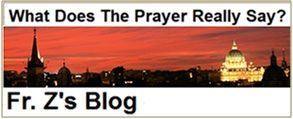 Write this to your local cardinal
Write this to your local cardinal
and all the cardinals gathering in Rome...

 Oh, if only... But of course it won't happen! The interested party has placed himself hors de combat for good reason.
Oh, if only... But of course it won't happen! The interested party has placed himself hors de combat for good reason.
But if I were Cardinal Meisner or Cardinal Bertone or Cardinal Schoenborn, any of those who consider themselves close to Benedict XVI, I would write JOSEPH RATZINGER on the first balloting when the gesture would not be bound to affect the voting in any way... I desperately want some historic gesture like that to be registered at the 2013 Conclave...
In any case, though it's five days too early before it is all formal:
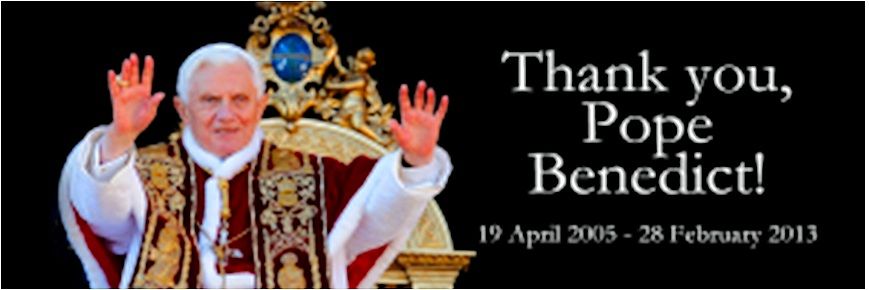
We will keep the fires of love burning for you
with our continuing prayers and undying Benaddiction.
[Modificato da TERESA BENEDETTA 23/02/2013 23:43] |
| |
 24/02/2013 00:20 24/02/2013 00:20 |
|
| | | OFFLINE | | Post: 26.352
Post: 8.844 | Registrato il: 28/08/2005
Registrato il: 20/01/2009 | Administratore | Utente Master | |
|
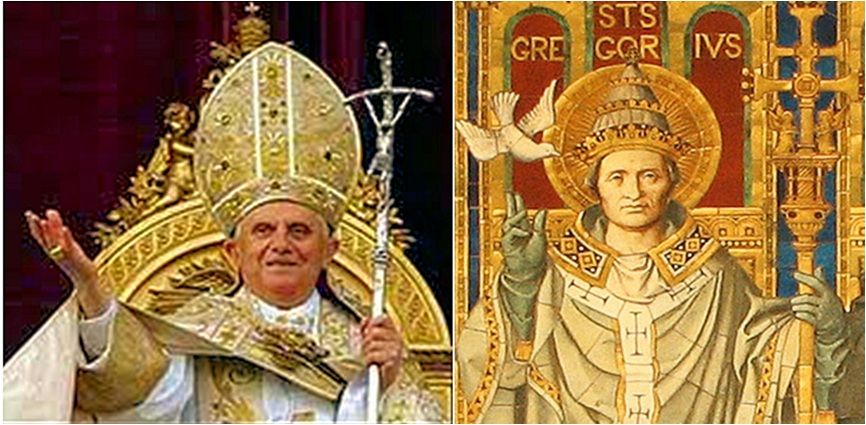 I just saw it today, but it gets my vote so far for the most perceptive and original reaction to the February 11 shocker. Barber is the author of a book on The Early Fathers of the Church, so he knows his material...
Did Benedict XVI take a page
I just saw it today, but it gets my vote so far for the most perceptive and original reaction to the February 11 shocker. Barber is the author of a book on The Early Fathers of the Church, so he knows his material...
Did Benedict XVI take a page
from Gregory the Great?
by Michael Barber

February 11, 2013
So why did Pope Benedict "renounce" his office? (I prefer "retire", but "renounce" is the most literal translation of the Latin text of his declaration).
Let me make a suggestion. Could it be that Benedict, who is well known for his encyclopedic knowledge of the Church Fathers, is taking a page not simply from Gregory XII, the last Pope to resign (1415), but also from Gregory the Great (540-604)? I have yet to see anyone point this out, but consider the following.
Gregory the Great wrote what is considered the classic treatment on the spiritual formation of pastors, The Book of Pastoral Rule. Benedict clearly recognizes the importance of this work.
During the series of Wednesday audiences Benedict devoted to the early Church Fathers, he had the following to say about Gregory's Pastoral Rule:
Probably the most systematic text of Gregory the Great is the Pastoral Rule, written in the first years of his Pontificate. In it Gregory proposed to treat the figure of the ideal Bishop, the teacher and guide of his flock...
Taking up again a favourite theme, he affirmed that the Bishop is above all the "preacher" par excellence; for this reason he must be above all an example for others, so that his behaviour may be a point of reference for all...
Nevertheless, the great Pontiff insisted on the Pastor's duty to recognize daily his own unworthiness in the eyes of the Supreme Judge, so that pride did not negate the good accomplished.
For this the final chapter of the Rule is dedicated to humility: "When one is pleased to have achieved many virtues, it is well to reflect on one's own inadequacies and to humble oneself: instead of considering the good accomplished, it is necessary to consider what was neglected".
All these precious indications demonstrate the lofty concept that St Gregory had for the care of souls, which he defined as the "ars artium", the art of arts. The Rule had such great, and the rather rare, good fortune to have been quickly translated into Greek and Anglo-Saxon. (General Audience, Wednesday, 4 June 2008).
Now check out what Gregory says about the need for the "ideal bishop" to be free from the frailties of the body:
That man, therefore, ought by all means to be drawn with cords to be an example of good living who already lives spiritually, dying to all passions of the flesh; who disregards worldly prosperity; who is afraid of no adversity; who desires only inward wealth; whose intention the body, in good accord with it, thwarts not at all by its frailness, nor the spirit greatly by its disdain: one who is not led to covet the things of others, but gives freely of his own. . ." (Gregory the Great, The Book of Pastoral Rule, 1.10 (cited from NPNF2 vol. 12, p. 7).
It is hard to read Benedict's statement today and not think of Gregory the Great's advice:
In today's world, subject to so many rapid changes and shaken by questions of deep relevance for the life of faith, in order to govern the bark of Saint Peter and proclaim the Gospel, both strength of mind and body are necessary, strength which in the last few months, has deteriorated in me to the extent that I have had to recognize my incapacity to adequately fulfill the ministry entrusted to me".
Gregory the Great became Pope in 590 when he was 50 years old and died 14 years later. I have not found out what he died of, but his earliest biographer said he "suffered almost continually from indigestion and, at intervals, from attacks of slow fever, while for the last half of his pontificate he was a martyr to gout".
In any case, gout and chronic indigestion in his early 60s clearly did not incapacitate Gregory to be Pope, and cannot be compared to the accelerating physical debilitation of advanced age that has overtaken Benedict XVI at 86... The earliest point of comparison made between Gregory the Great and Benedict the Sublime (if I may be permitted to coin a phrase) was that Gregory's writings "were more prolific than those of any of his predecessors as Pope". Read more about the great Pope in the Catholic Encyclopedia
www.newadvent.org/cathen/06780a.htm
P.S. I beg pardon... but it turns out at least someone else wrote about the Gregory-Benedict connection on that fateful February 11, and in a larger context... The writer is President and Fellow of the Thomas More College of Liberal Arts in Merrimack, New Hampshire...
The reason Benedict resigned
by William Fahey

February 11, 2013
The Catholic world is largely shocked by the publication of Pope Benedict XVI’s letter of resignation this morning. The secular world assumes the worst —no, it desires the worst, and by insinuation worms doubts into the minds of even the faithful.
The secular world will tear through the brief letter and fixate upon the line about a “world, subject to so many rapid changes and shaken by questions of deep relevance for the life of faith.” It will weave from these deconstructed words an existential tale of despair, scandal, and an authority which realizes it is no longer in touch with reality.
Nothing could be further from the truth.
Benedict’s resignation is utterly consistent with his character. It is traditional — he brings from our history and our law a fact and feature of the Papal Office: one can and — under certain circumstance — should put aside that office.
His resignation demonstrates once again the firm mark of a father and a teacher. A father knows that his role is to provide example, instruction, and discipline, and ultimately put himself aside for the good of his own.
The Petrine ministry is not exercised for a man, or for bishops and priests, or even for Catholics alone. It is a ministry exercised for all those seeking God and for all those towards whom God’s mercy is extended. It is a demanding office.
As with every text published by Benedict, this letter of resignation has no imbalance, flab, impression, or vagueness. Not a word goes astray. It is shot through with paternal love and professorial clarity.
An honest reading of this document can only lead to profound gratitude and sympathy for a suffering father who must understand each act and decision he makes as having “great importance for the life the Church.”
No one could doubt that this Holy Father has meditated profoundly, and I expect repeatedly, on The Pastoral Rule of St. Gregory the Great — that sixth-century handbook for those who hold the highest spiritual authority, what Benedict and others have called the ars artium (“the art of arts”).
Much of the book is a warning against the wrong reasons for grasping or holding on to power, followed by an outline of the virtues needed to exercise leadership well. In the first book of The Pastoral Rule we find this line, which I believe has quietly echoed for some weeks in the Holy Father’s thoughts: “He must be a man whose aims are not thwarted by the frailty of his body.”
The office of Peter is not just a spiritual thing which discounts human nature. That sacred ministry resides with a person, but that person must have the nature to exercise its rigors.
Benedict XVI has marked his pontificate by humility. If anything, he has tried to depersonalize the use of authority, even that uniquely personal authority, the Petrine Office. Yet we must always remember that the “person” of the Papal ministry is St. Peter, who with his successors acts in the person of Christ.
The papacy is a lived authority and a living authority and one that must respond to the needs of the Age. It is natural that we love the concrete that we know, and love the particular character of our popes.
And we must do our best to accept that like a humble and adored teacher, Benedict now forces on his students a hard lesson: that the teacher should never be the focus of our final attention and love. {Oh, we all know that - he is the finger pointing to the sun that is Christ, but he was also the Vicar of Christ on earth for the past eight years, and what a Vicar! He has so internalized and assimilated Christ that he radiates Christ.]
Our age has become overly focused on a model of “leadership” which is nothing short of superficial, for whom the shallow gilt of charisma and “personality” have blinded everyone to questions of duty and responsibility. Benedict’s resignation teaches us once again that leadership — while exercised by a person — is not about that person.
Benedict has set before our eyes the old Roman sense of officium— duty, office, responsibility. Benedict’s embrace of the Petrine office has always been a reluctant one, and that reluctance is born of clear self-knowledge and deep understanding of the history and purpose of papal authority.
The following words are taken from one of the Holy Father’s General Audiences in 2008. He spoke on St. Gregory the Great and his reluctance to sit on the throne of St. Peter, reluctance that gave way to grace, prayer, and action.
Recognizing the will of God in what had happened, the new Pontiff immediately and enthusiastically set to work. From the beginning he showed a singular enlightened vision of the reality with which he had to deal, an extraordinary capacity for work confronting both ecclesial and civil affairs, a constant and even balance in making decisions, at times with courage, imposed on him by his office.
These are not words set down in a theoretical fashion. They rise from the Holy Father’s lips with experience behind them.
More moving are Benedict’s closing words from the following day’s audience. Again, speaking on St. Gregory and his lonely pontificate, he ends:
Gregory remained a simple monk in his heart and therefore was decidedly opposed to great titles. He wanted to be — and this is his expression — servus servorum Dei, servant of the servants of God.
Coined by him, this phrase was not just a pious formula on his lips but a true manifestation of his way of living and acting. He was intimately struck by the humility of God, who in Christ made himself our servant. He washed and washes our dirty feet. Therefore, he was convinced that a Bishop, above all, should imitate this humility of God and follow Christ in this way.
His desire was to live truly as a monk, in permanent contact with the Word of God, but for love of God he knew how to make himself the servant of all in a time full of tribulation and suffering. He knew how to make himself the “servant of servants.” Precisely because he was this, he is great and also shows us the measure of true greatness.
The Holy Father’s reasons for resignation spring from a grave sense of office and a faithful belief in what that office truly is. He has remained through his pontificate faithful and true to his vocation of father and teacher. Both father and teacher must daily put aside themselves to be true to their calling.
The papacy is not a mere person, it is not a great man, it is certainly not a bloodline or earthly principality. It is the ministry of the Bishop of Rome, Successor of St. Peter. It is a sacred office entrusted to the entire Church. It is an enduring stewardship through time. Behind the Vicar stand the Kingship of Christ and the enduring nature of His Church, yesterday, today, and forever.
By the grace of the Holy Spirit, Pope Benedict XVI has resigned. His Holiness has resigned because he understands his office and he wishes with firm resolve to help us to understand this and deepen our faith by remembering him for what he is and by lifting up our hearts and minds to the eternal Father and His Son, Our Supreme Pastor and Lord, Jesus Christ.
[Yes, but Mr. Fahey, you dropped the argument on the one and only reason he resigned - the very real and inescapable fact that advanced age has made him physically incapable of carrying out his mission in the only way he can carry it out and should carry it out: totally and with the maximum excellence. This very practical and logical reason should never be subsumed by all its possible extrapolations, no matter how lofty. The humble worker in the vineyard of the Lord has his feet planted firmly on the ground of realism, but for all that, he is sublime, with a spirit that soars, a heart that thinks and a mind that feels. I'm still giddy from his words this morning after the retreat that "to believe is to touch the hand of God in the darkness of this world". What better motto for the Year of Faith? The amazing things he pulls out all the time from his bag of graces... And we only have five more days of 'exterior visible communion' with him...Now I'm babbling...]
I still have not worked up the gumption to look at how the major newspapers covered THE ANNOUNCEMENT (though I have to do that eventually), because I fully expected the stories to be a hastily amended version of the obituaries they had in store when the time comes. So I was surprised to come across this Op-Ed article that the New York Times published on that fateful day. It is excellent for an instant commentary, even if the writer - who teaches world religions in Smith College - gets it wrong about Regensburg...
The humble Pope
By CAROL ZALESKI
Op-Ed Page

February 11, 2013
NORTHAMPTON, Mass. - POPE BENEDICT XVI is the latest of a small number of popes to resign the chair of St. Peter.
The most famous of these — the one whose resignation had all the earmarks of an abdication — was Pietro del Morrone, Pope Celestine V, the saintly Benedictine hermit who resigned in 1294 after only a few months, realizing that he was called to serve his church through prayer and penance rather than bitter politics and gorgeous, endless public ceremonies. It was a decision Benedict honored.
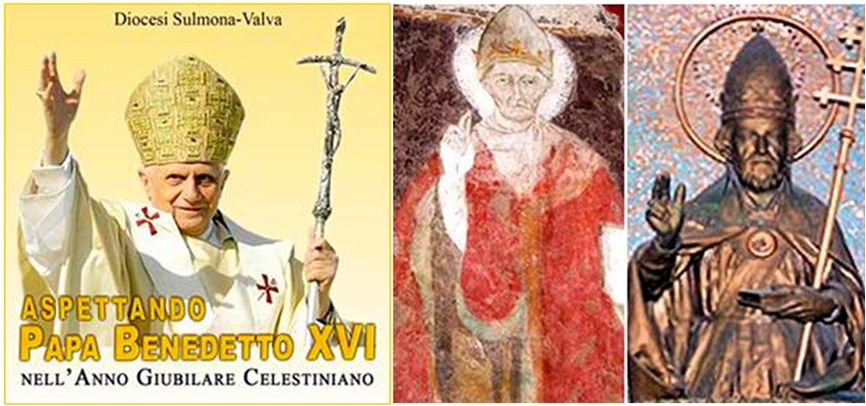
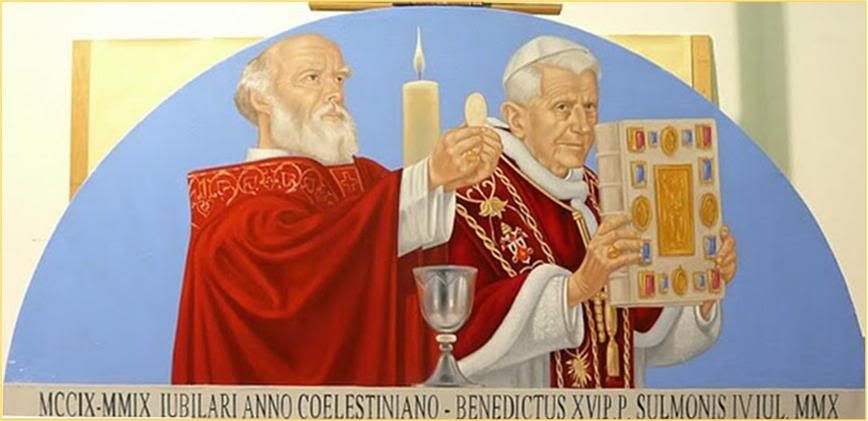 Mural depicting the two Popes in Sulmona Cathedral
Mural depicting the two Popes in Sulmona Cathedral .
It was a decision Benedict honored. In July 2010 he attended the celebration of the 800th anniversary of Celestine’s birth in Sulmona, Italy, and spoke of this medieval pontiff’s capacity for inner silence and “vivid experience of the beauty of creation.”
The previous year, while visiting the same region after a devastating earthquake, Benedict placed his pallium — the narrow band of wool with which he was invested at his inauguration — over the case containing Celestine’s remains, and left it behind. It was a significant foreshadowing of the moment when he too would resign and, like Celestine, face the uncertain verdict of history.
It cannot have escaped Benedict’s notice that, according to a traditional (though debatable) interpretation of “The Inferno,” Pope Celestine is the figure Dante met in the vestibule to hell: “I saw and recognized the shade of one who, through cowardice, made the great refusal.” Anyone who has this job can expect to be misunderstood.
Chief among the misunderstandings of Benedict’s pontificate are those that cluster around the unhelpful label of “conservative.” He is far too astute a scholar and too modern a churchman for such a label to be of much use.
Unfortunately, one still hears him accused of turning the clock back on the reforms of the Second Vatican Council, thwarting the liturgical renewal it mandated and keeping the laity firmly in its place — an impression that would not survive a careful reading of his papal documents alongside the actual texts of the council.
In fact, under Benedict’s leadership, the celebration of Mass, the “source and summit” of Catholic life, has begun to mirror more faithfully the reforms that the Second Vatican Council intended. Beauty is back in season, and millions of Catholics around the world are embracing this change with gratitude.
For the intellectuals of many faiths who admire him, Benedict is a profound religious thinker in the Augustinian tradition according to which the longing for truth is innate and universal and the various disciplines of philosophy, theology and the natural sciences all have as their ultimate aim a personal union with truth.
With his distinctly non-fundamentalist interpretation of the Book of Genesis; his sophisticated handling of recent trends in biblical criticism (most notably, though least noticed, his book “Eschatology: Death and Eternal Life”); his role in the creation of the modern Catholic catechism; and his papal writings on faith, reason and love (beginning with his extraordinary first encyclical “God Is Love”), Pope Benedict has opened a new era in the dialogue between religion and secular reason.
His errors, of course, have been amply recorded. Less attention has been given to his efforts to make amends.
The speech he made in 2006 at the University of Regensburg was a public relations disaster: one wonders how, in the midst of a deeply thoughtful reflection on faith and reason, he failed to foresee the damage he would cause by quoting, without evaluation, the Islamophobic remarks of a 14th-century Byzantine emperor.
[Too bad even someone like Prof. Zaleski missed the point completely about that citation. It was most definitely part of the deep thought that went into the Regensburg lecture - it was an actual, rare and most dramatic illustration of civilized frank dialog between a Christian emperor, on the verge of being dethroned by the Muslim Turks, and a learned Persian Muslim, who did not scream blasphemy and cut off the emperor's head for what he said about Mohammed, but in fact, sustained further conversations with him enough for the emperor to write a book about it afterwards. To be consistent, the Muslims who protested the citation in 2006 should also have condemned the Persian Muslim for calmly listening to those words about Mohammed, or at the very least, contested that a Muslim could ever have done so! The citation was not just a frivolous footnote in a scholarly presentation, but integral to its thesis of faith and reason. Benedict XVI admitted to Peter Seewald in 2010 that he did not foresee his academic discourse to an audience of scholars would be turned into a cause celebre, but he did not regret making the citation. Besides, Regensburg must never be brought up without mentioning Istanbul and the Blue Mosque as well, because they represent the parameters of Benedict XVI's thinking on reason and faith.]
The upshot of the resulting debate, though, was an improvement in Catholic-Muslim relations, for which Pope Benedict deserves some credit. ['Some credit'? There would never have been any improvement without Regensburg-Istanbul. Istanbul convinced moderate Muslim thinkers that this was no gratuitously provocative Pope but the partner they could have in an effort to stimulate a much-needed Islamic enlightenment, as he had proposed in Regensburg!]
His critique of New Age versions of Buddhism as narcissistic was poorly phrased, and instantly misunderstood; yet even this gaffe provided an occasion for fruitful dialogue.
[It wasn't poorly phrased, it was poorly translated. But I am happily surprised that Prof. Zaleski used the word 'narcissistic', because the common English account that has been perpetrated of that statement is based on a literal translation of the French phrase 'auto-erotisme spirituel' as 'spiritual masturbation'. An item I posted back in 2009 in the Papa Ratzinger Forum
http://freeforumzone.leonardo.it/lofi/ENCOUNTERS-WITH-THE-FUTURE-POPE-Stories-about-Joseph-Ratzinger-before-he-became-Pope/D354530-4.html
was written by a blogging Buddhist monk who met Cardinal Ratzinger in San Francisco in 1999, and he said about the controversial phrase: "It turns out that the Cardinal's views were written first in a French Catholic journal[he gave the interview in French actually], and in French, the phrase 'auto-erotisme' means 'self-absorption', or narcissism. Unfortunately, the English-language press heard the term without benefit of translation..."
I have not managed to find the original interview given in 1997, but the English translation of the controversial remark quoted in various Anglophone sources puts it thus: "If Buddhism is attractive [to people in the West], it is because it appears as a possibility of touching the infinite and obtaining happiness without having any concrete religious obligations. A sort of spiritual masturbation..." Of course, the statement makes more sense if that offensive translation of 'auto-erotisme' were replaced by 'self-absorption', which has, in fact, been the hallmark of the 'me, myself and I' generations that have emerged since 1968. Indeed, a Buddhist reader, reacting to the monk's blog, observed quite rightly that the cardinal was not referring to Buddhism as such, but to the idea that Westerners have of it. Not surprisingly, the Dalai Lama has consistently polled much higher than Benedict XVI among Germans who are asked about their idea of a spiritual leader!]
He was willing to allow that condoms might have value in preventing the transmission of H.I.V. in Africa. And where bioethics and sexual ethics are concerned, he has sought to clarify the consistent rationale of Catholic teaching, to defend the dignity of the human person, and to carry on the version of feminism that one associates with John Paul II.
Pope Benedict’s announcement that he is retiring — made on the feast day of Our Lady of Lourdes, the World Day of the Sick, on the threshold of an early Lent — was his “Nunc dimittis” [the old Simeon's canticle at the presentation of Jesus in the Temple, which starts with the words "Now, Master, you may let your servant go in peace, according to your word..." What a lovely and appropriate simile to bring up! Thank you, Prof. Zaleski!]
It is his final summons to a weary Church to look beyond politics and the calculus of power, and to recover its real sources of renewal.
Even the “spiritual but not religious” set might be intrigued by a Pope who, by resigning his position, admits not only his own frailty but that of the throne on which he has been seated.
What I see in Pope Benedict XVI is not the shade of one who through cowardice made the great refusal, but the substance of one who through humility and wisdom made the great acceptance.
[Modificato da TERESA BENEDETTA 25/02/2013 23:48] |
| |
 24/02/2013 13:25 24/02/2013 13:25 |
|
| | | OFFLINE | | Post: 26.353
Post: 8.845 | Registrato il: 28/08/2005
Registrato il: 20/01/2009 | Administratore | Utente Master | |
|

 The Pope and President Napolitano:
The Pope and President Napolitano:
Benedict XVI's last event as head of state
Translated from

February 23, 2013
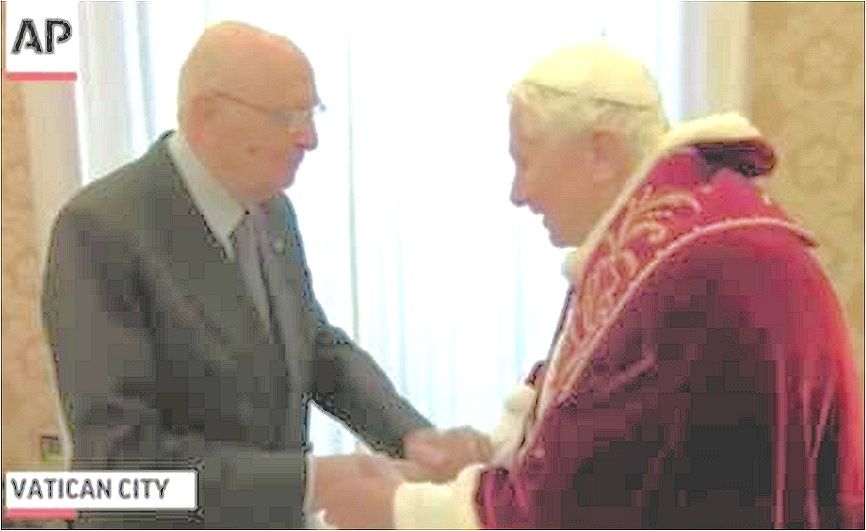
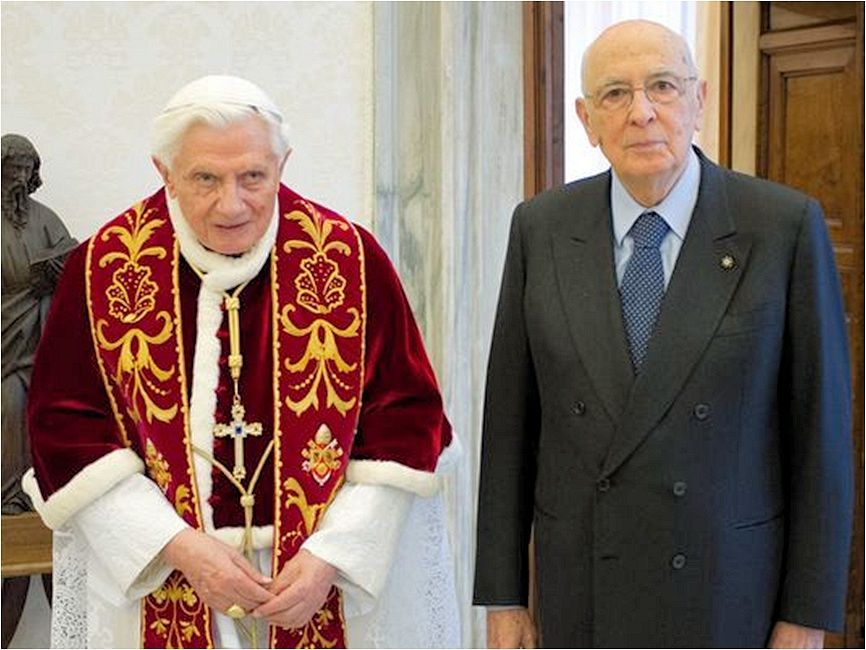
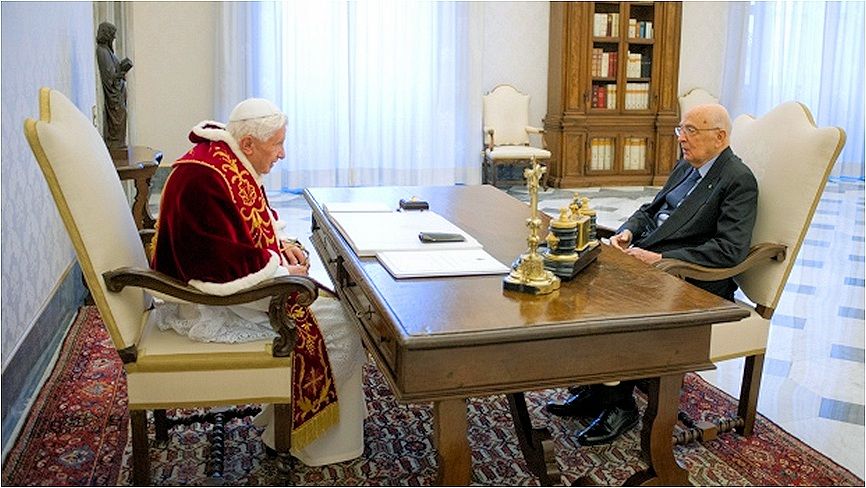
Communique from the Secretariat of State
This morning at 11:30, the Holy Father Benedict XVI
held a farewell meeting with the President of teh Italian Republic, Giorgio Napolitano, and his spouse.
The meeting was particular intense and cordial, given the great reciprocal esteem and long familiarity with each other of the Pope and the President.
President Napolitano expressed to the Pope not just the gratitude of the Italian people for his closenes during so many crucial times for the nation and for his high religious and moral teaching, but also the affection with which Italians will continue to have for him.
For his part, the Pope expressed once more to the President and Mrs. Napolitano his gratitude for their friendship, as well as his best wishes for the Italian people, especially during these days when Italians face significant decisions.
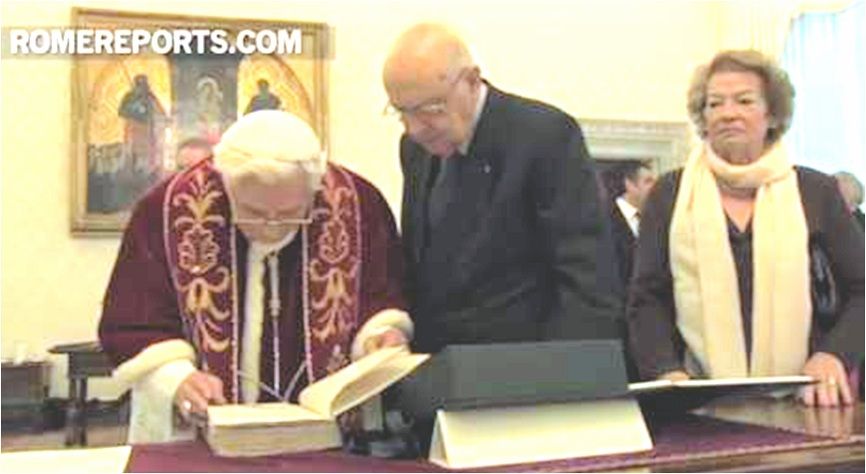
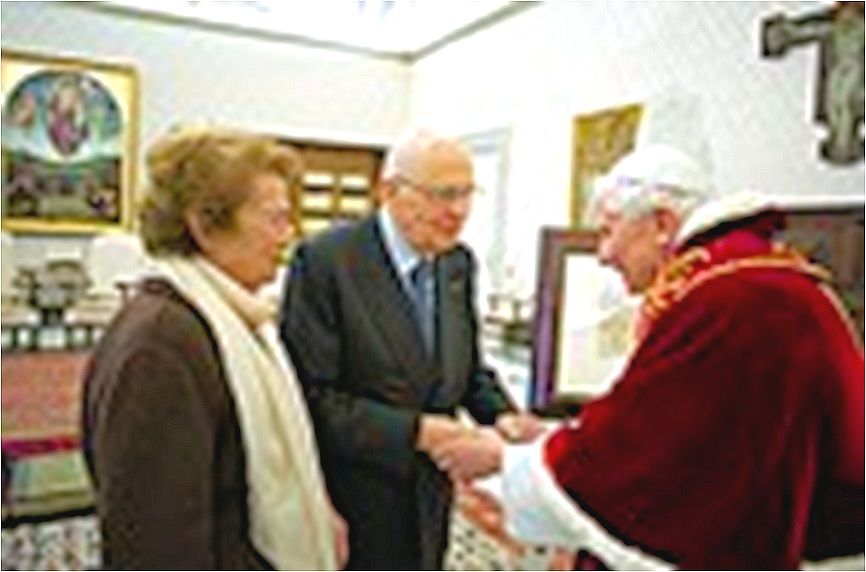 I am sorry for the uneven and/or poor quality of the photos. I had been awaiting the usual newsphoto series from Yahoo, but instead, I have had to search out photos where I could.
I am sorry for the uneven and/or poor quality of the photos. I had been awaiting the usual newsphoto series from Yahoo, but instead, I have had to search out photos where I could. |
| |
 24/02/2013 13:53 24/02/2013 13:53 |
|
| | | OFFLINE | | Post: 26.354
Post: 8.846 | Registrato il: 28/08/2005
Registrato il: 20/01/2009 | Administratore | Utente Master | |
|

 February 24, Second Sunday of Lent
February 24, Second Sunday of Lent
 Illustrations include the Belludi chapel in Padua; Luca invoking St. Anthony's intercession; and the saint and his disciple.
BLESSED LUCA BELLUDI (Italy, 1200-1285)
Illustrations include the Belludi chapel in Padua; Luca invoking St. Anthony's intercession; and the saint and his disciple.
BLESSED LUCA BELLUDI (Italy, 1200-1285)
Franciscan priest, Disciple and Companion of St. Anthony of Padua
Tradition says that Luca, a young noble student at the University of Padua, walked up to Anthony after
hearing him preach and asked to join the Franciscans, and that Anthony was so impressed by him that
he eventually had him ordained by St. Francis himself. In any case, he became Anthony's devoted
companion in his travels and preaching for the rest of his life. After Anthony died, Luca was named
to succeed him as head of the Franciscans in Padua and he started to build the basilica in his honor. But
a local tyrant took over Padua and Luca was exiled. He is said to have asked for Anthony's intercession
to liberate the city. He came back to continue building the basilica, founded other monasteries and carried
on St. Anthony's work for another 30 years. He was credited with working miracles like Anthony did, and
when he died, he was buried in the same tomb as Anthony. His remains were separated only in 1971, and
are now kept in the Belludi chapel of the Basilica in Padua. An inscription said of him: “Disciple and
companion of St. Anthony, he was a truly learned man, most excellent of preachers, and in his teaching
and life little different from his master". Always called 'Beato Luca' since his death, he was not formally
beatified until 1927.
Readings for today's Mass: www.usccb.org/bible/readings/022413.cfm
AT THE VATICAN TODAY
Benedict XVI leads his last Angelus as Pope - Fittingly, today's Gospel is on the Transfiguration, and
as he thanked the faithful for their prayers and affection, saying the Gospel was an invitation for man
to continually 'ascend the mountain' to meet God. He said that he felt called by God to make this ascent
in order to dedicate himself even more to prayer and to meditation. But, he said, "this does not mean
avandoning the Church. Rather, if God asks this of me, it is so that I may continue to serve the Church
with the same dedication and the same love with which I have sought to do but in a way that is more
appropriate to my age and my remaining strengths".
|
| |
 24/02/2013 14:13 24/02/2013 14:13 |
|
| | | OFFLINE | | Post: 26.355
Post: 8.847 | Registrato il: 28/08/2005
Registrato il: 20/01/2009 | Administratore | Utente Master | |
|
 Benedict XVI's last Angelus from
Benedict XVI's last Angelus from
the world's most famous window
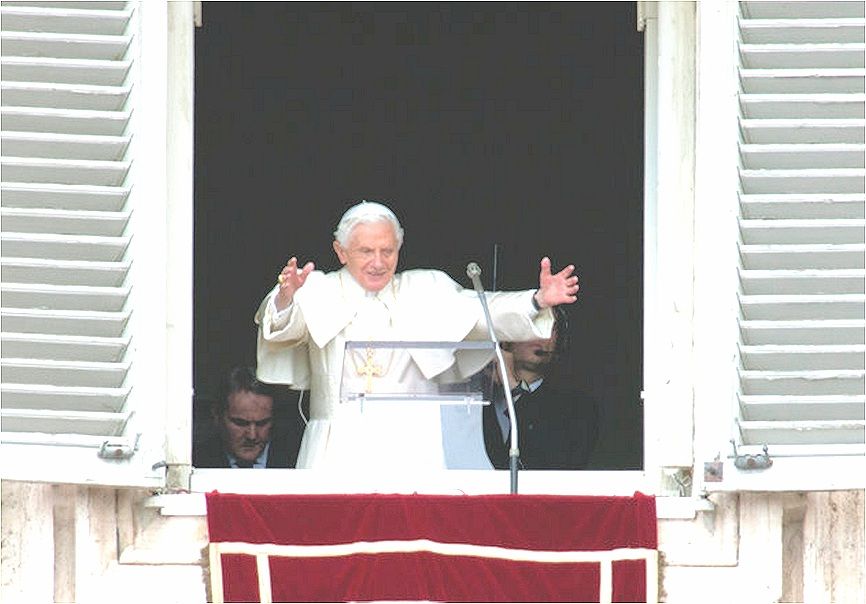
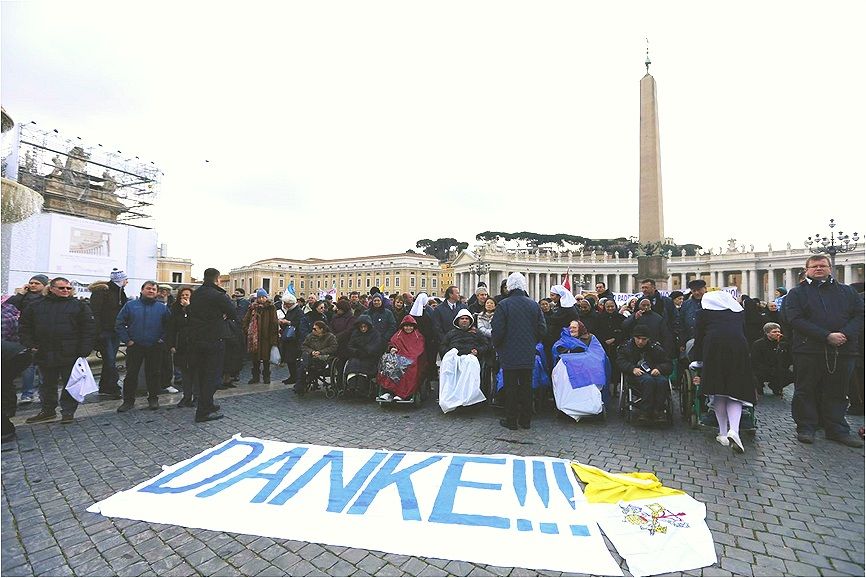 'I will continue to serve the Church
'I will continue to serve the Church
with the same love and dedication but
in a way more suited to my age and strength'

"The Lord is calling me to 'climb the mountain', to devote myself even more to prayer and meditation. But this does not mean abandoning the Church, indeed, if God is asking me to do this, it is so I can continue to serve the Church with the same dedication and the same love with which I have done thus far, but in a way that is better suited to my age and my strength... We will always be close in prayer!"
This was Pope Benedict XVI’s parting message on Sunday, during his last Angelus address. At noon the canons sounded from the Janiculum hill and the great bells of St Peter’s basilica rang out. And as the curtains were drawn from his study windows and the red papal banner unfurled, the ocean of pilgrims waiting below erupted into acclamation.
They had come in their thousands, pouring into the square since early dawn, men, women and children, old and young, religious and lay Catholics. They held banners, emblazoned with messages of gratitude and farewell for the 85-year old Pope, who had guided them in the faith over the past eight years.
Pilgrims such as a father and his young son from the earthquake devastated city of Aquilla, central Italy, who held aloft a homemade sign, thanking Pope Benedict for having visited the city’s people in their time of need, for his material support and spiritual solidarity.
the Dominican nuns from the Philippines who had held vigil since dawn praying the rosary. And beside them the young people in their sleeping bags, from Spain, Brazil, Mexico, with their banner that read “the gates of hell will never prevail”.
With outstretched arms and visibly moved, Pope Benedict greeted them all, repeating ‘Grazie, Grazie,’ as he attempted to quiet the crowds. An almost impossible task.
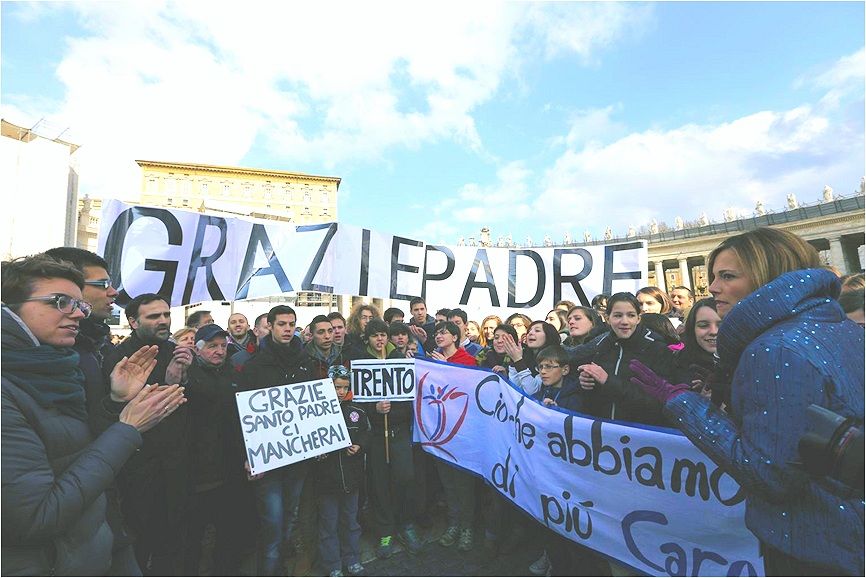
Here is a translation of Benedict XVI's last Angelus reflection as Pope:
Dear brothers and sisters:
Thank you for your affection.
Today, the second Sunday of Lent, we have a particularly beautiful Gospel account, that of the Transfiguration of the Lord.
The evangelist Luke especially highlights the fact that Jesus was transfigured as he prayed: His was a profound experience of relationship with the Father during a kind of spiritual retreat that Jesus had on a mountain in the company of Peter, James and John - the three disciples who were always present at the moments of the Master's divine manifestation (Lk 5,10; 8,51; 9,28).
The Lord, who had pre-announced his death and resurrection not long before this (9,22), offered the disciples a foretaste of his glory. In the Transfiguration, as at the Baptism, the voice of the heavenly Father rang out: "this is my chosen Son. Listen to him!" (9,35).
The presence of Moses and Elijah, who represent the Law and the Prophets of the Old Testament, is just as significant: The entire story of the Old Covenant is oriented towards him, the Christ, who would lead a new 'exodus' (9,31), not towards the Promised Land as in the time of Moses, bot towards Heaven.
Peter's remark, "Master, it is good that we are here" (9,33) the represents the impossible attempt to dwell in such a mystical experience.
St. Augustine commented: "(Peter)... on the mountain.., had Christ for nourishment of the soul. Why did he have to descend to return to labor and suffering when up there, it was full of holy love for God which therefore inspired holy conduct?" (Discourse 78,3: PL 38,491).
Meditating on this Gospel passage, we can draw a very important teaching. First of all, the primacy of prayer, without which all the commitment of apostolate and charity is reduced to activism.
During Lent, let us learn to give the proper time to prayer, personal as well as communal, which gives breath to our spiritual life. Moreover, prayer is not isolation from the world and its contradictions, as Peter wished it to be on Mt. Tabor, but prayer leads us back to the journey, to action.
"Christian existence", I wrote in the Message for Lent this year, "consists in continuously scaling the mountain to meet God and then coming back down, bearing the love and strength drawn from him, so as to serve our brothers and sisters with God’s own love." (No.3).
Dear brothers and sisters, this Word of God I have felt particularly addressed to me at this time in my life...Thank you!
The Lord has called me to 'climb the mountain', to dedicate myself more to prayer and meditation. But this does not mean abandoning the Church. Rather, is God is asking this of me, it is so that I can continue to serve her with the same dedication and the same love that I have tried to do till now, but in a way that is more suitable to my age and strength.
Let us ask the intercession of the Virgin Mary, she who helps all of os us to always follow the Lord Jesus in prayer and in charitable acts.
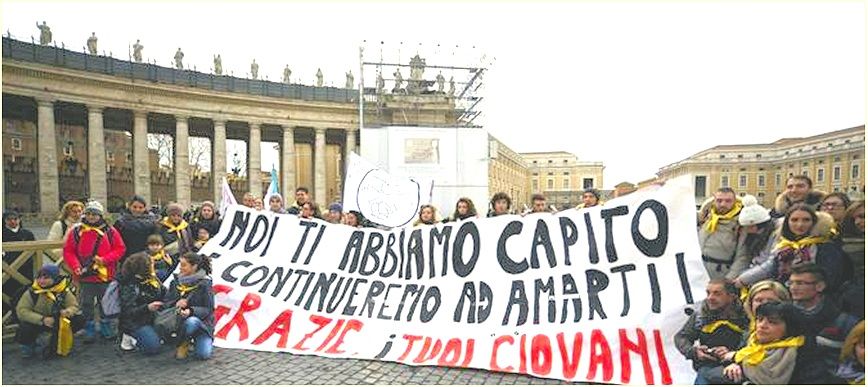 'WE HAVE UNDERSTOOD YOU AND WILL CONTINUE TO LOVE YOU..
'WE HAVE UNDERSTOOD YOU AND WILL CONTINUE TO LOVE YOU..
THANK YOU' - YOUR YOUNG PEOPLE
A final Angelus blessing
by Frances D'Emilio

VATICAN CITY, February 24, 2013 (AP) — Pope Benedict XVI gave his pontificate's final Sunday blessing from his studio window to the cheers of tens of thousands of people packing St. Peter's Square, but sought to reassure the faithful that he wasn't abandoning the church by retiring to spend his final years in prayer.
The 85-year-old Benedict is stepping down on Thursday evening, the first pope to do so in 600 years, after saying he no longer has the mental or physical strength to lead the world's 1.2 billion Catholics. [I don't know why the AP keeps using this phrase!]
But while he has lately looked tired and frail, the crowd filling the cobblestone square seemed to energize him, and he spoke in a clear, strong voice, repeatedly thanking the faithful for their closeness and affection as they interrupted him, again and again, with applause and cheers. Police estimated some 100,000 people turned out.
Benedict told the crowd that God is calling him to dedicate himself "even more to prayer and meditation," which he will do in a secluded monastery being renovated for him on the grounds behind Vatican City's ancient walls.
"But this doesn't mean abandoning the church," he said, as many in the crowd looked sad at his departure from regular view. "On the contrary, if God asks this of me, it is so I can continue to serve it (the Church) with the same dedication and the same love which I have tried to do until now, but in a way more suitable to my age and to my strength."
The phrase "tried to" was the Pope's adlibbed addition to his prepared text.
Benedict has one more public appearance, a Wednesday general audience in St. Peter's Square.
Benedict smiled at the crowd after an aide parted the white curtain at his window, telling the people, "thank you for your affection."
Heavy rain had been forecast for Rome, and some drizzle dampened the square earlier in the morning. But when Benedict appeared, to the peal of church bells as the clock struck noon, blue sky crept through the clouds.
"We thank God for the sun he has given us," the Pope said, sounding cheerful.
As cheers continued in the crowd, the Pontiff simply turned away from the window and stepped back down into apartment, which he will leave on Thursday, taking a helicopter to the Vatican summer residence in the hills outside Rome while he waits for the monastery to be ready.
A child in the crowd held up a sign on a yellow placard, written in Italian, "You are not alone, I'm with you." Other admirers held homemade signs, saying "Grazie."
No date has yet been set for the start of the conclave of cardinals, who will vote in secret to elect Benedict's successor.
One Italian in the crowd seemed to be doing a little campaigning, hoisting a sign which mentioned the name of two Italian cardinals considered by observers to be potential contenders in the selection of the next pontiff.
Flags in the crowd represented many nations, with a large number from Brazil.
The cardinals in the conclave will have to decide whether it's time to look outside of Europe for a Pope.
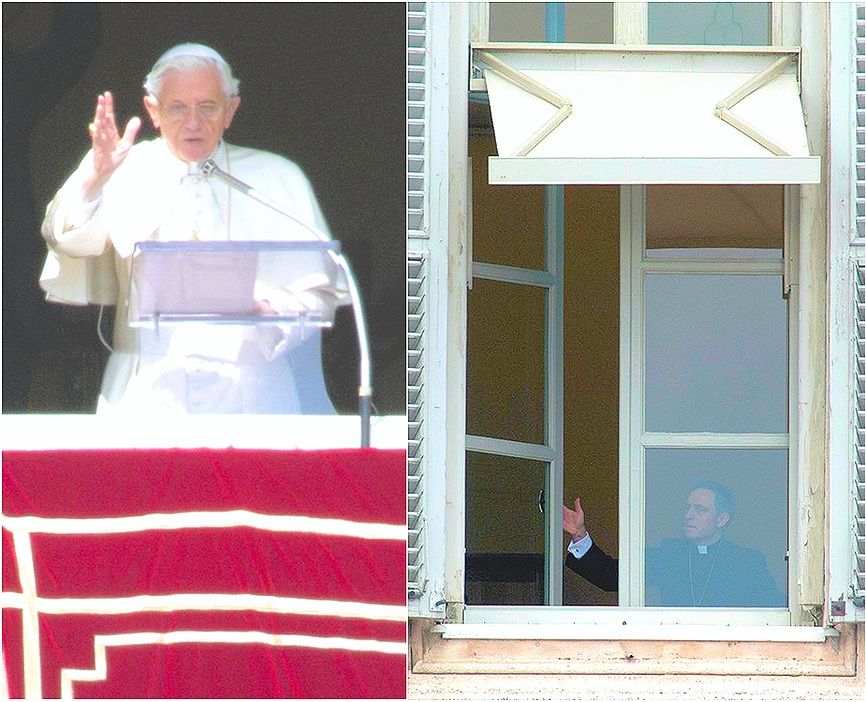 The last Angelus blessing from Benedict XVI as Pope...
The last Angelus blessing from Benedict XVI as Pope...
and Georg Gaenswein closes the 'Angelus window' for the last time...
[Modificato da TERESA BENEDETTA 24/02/2013 15:40] |
| |
 24/02/2013 14:41 24/02/2013 14:41 |
|
| | | OFFLINE | Post: 416
Post: 126 | Registrato il: 28/05/2007
Registrato il: 19/02/2009 | Utente Comunità | Utente Junior | |
|
Brave soldier of The Lord Andare avanti!!
Seems to be his message once more.
With him on the mountain as a spiritual giant!
I still have no words to express my pain.
It's a roller coaster ride of emotions.
|
| |
 26/02/2013 03:34 26/02/2013 03:34 |
|
| | | OFFLINE | | Post: 26.357
Post: 8.848 | Registrato il: 28/08/2005
Registrato il: 20/01/2009 | Administratore | Utente Master | |
|

 Monday, February 25, Second Week of Lent
Monday, February 25, Second Week of Lent
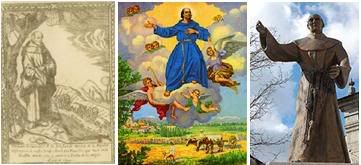 BLESSED SEBASTIAN DE APARICIO (b Spain 1502 - d Mexico 1600)
BLESSED SEBASTIAN DE APARICIO (b Spain 1502 - d Mexico 1600)
Roadbuilder, Franciscan brother
Beato Sebastian has one of the most unusual biographies. Born in Spain to a poor family, who brought him up in the faith, he fell ill with bubonic plague as a a boy, from which he was miraculously cured after having been isolated to avoid infecting his family. After various migrant jobs all over Spain, he emigrated at age 31 to Mexico where he started as a farm hand and jack of all trades, then decided to build roads that would facilitate commerce in the region. He is considered the father of Mexican highways, as well as Mexico's first 'cowboy' who domesticated wild horses and cattle to be used in farm work. He introduced ox-driven carts to replace the labor carried out by humans before then. By age 50, he was a wealthy man, who had a reputation for unfailing generosity and service to the natives. He then gave up the transport business to devote himself to agriculture and ranching. Part of his personal faith was his early vow to live a chaste life. In his 60s, he married twice - both times to provide his wife's family with a dowry, and with the understanding that it would be a chaste marriage. Both wives died within a year of marriage - the first of an illness, the second because she fell from a tree while picking fruit. He said of them, "God gave me two little doves to care for and send back to him". After this, he decided to become a Franciscan friar, giving away all his goods to the convent and to the poor. He spent his novitiate as cook, porter and gardener in a Poor Clares convent, and finally became a professed friar in 1575. He spent the next 23 years as alms-collector for his community, once again taken to the roads in his horse-drawn carts for a new purpose, and came to be known as the 'fraile de las carretas'. He never learned to read and write, and all his life, his prayers were limited to the Our Father and the Rosary. Many miracles started being attributed to him in the last 10 years of his life, and he died in the odor of sanctity at age 98. His incorrupt body is venerated in the Church of St. Francis in Puebla, Mexico. When he was beatified in 1789, 968 documented miracles were presented in his cause, of which more than 500 beneficiaries testified personally.
Readings for today's Mass: www.usccb.org/bible/readings/022513.cfm
AT THE VATICAN TODAY
The Holy Father Benedict XVI met this morning with
- Cardinals Julián Herranz, Jozef Tomko and Salvatore De Giorgi (the cardinals he named last summer to undertake
a full administrative investigation of Vatileaks and the environment in the Vatican that has allowed or promoted
turf wars and bureaucratic intrigue).
- Cardinal Marc Ouellet, Prefect of the Congregation for Bishops.
By a singular coincidence, the last one-on-one audiences held by Benedict XVI with his cardinals fell to Cardinals Angelo Bagnasco and Angelo Scola of Genoa and Milan, respectively, who headed their regional bishops' ad-limina visit to the Holy Father this year, and whom the Pope met with on Friday and Saturday respectively before the Lenten retreat of the Curia. Now Cardinal Ouellet, in their last weekly meeting to decide on episcopal appointments around the world. All three also happen to be among the leading papabile in this year's unusually tepid toto-Papa (papal sweepstakes) speculation. A subject I have studiously avoided.
- Benedict XVi continued to make news in other ways by issuing the expected motu proprio modifying or clarifying procedural details in what happens during the sede vacante and the Conclave that will choose a new Successor of Peter.
- He also sent a telegram of condolence on the death of one of the over-80 cardinals he created (consistory of February 2012), Belgian Cardinal Julien Ries, 83, who had been called 'the greatest living religious scholar' of our time. The telegram was sent to the Bishop of Tournai (Belgium). Here is a translation from the French.
HIS EXCELLENCY MONSEIGNEUR GUY HARPIGNY
BISHOP OF TOURNAI
Having learned with emotion about the death of Cardinal Julien Ries, I extend to you my most sincere condolences as well as to his fmaily and those close to him.
May the Lord welcome to the light of eternal liufe this eminent man of faith who faithfully served the Church. Through his teaching and research, especially in the field of the history of religions, in which he was a recognized expert, he was always concerned with bearing witness to his faith among his contemporaries in a spirit of dialog.
As a token of cinfirt. I extend to you a special Apostolic Blessing, as well as to the family of the late Cardinal and those close to him; to the religious who surrounded and supported him in his work, and to all who will take part in his funeral rites.
BENEDICTUS PP XVI
- Meanwhile, Cardinal Tarcisio Bertone sent a message to all the members of contemplative orders in the Church, saying that the Holy Father's appeal to the faithful "to accompany him with their prayers as he commends the Petrine ministry into the Lord’s hands, and to await with trust the arrival of the new Pope" was especially directed at the contemplatives around the world, who "provide the precious resource of that prayerful faith which down the centuries has accompanied and sustained the Church along her pilgrim path". He extends the thanks of Benedict XVI "who is deeply appreciative and... assures you of his immense love and esteem".
- But there was distressing news in the resignation of Cardinal Keith O'Brien as Archbishop of St. Andrew and Edinburgh in Scotland, following public accusations by three priests and an ex-priest claiming that O'Brien had made improper advances to them when they were seminarians.
The Vatican announced that the Pope had accepted O'Brien's resignation for having reached canonical retirement age (he turns 75 on March 15). O'Brien announced he will not now be taking part in the Conclave.
True or not, the accusations are devastating for the image of the Church on the eve of a Conclave. It gives a powerful guided missile to the enemies of the Church to attack all over. As censurable as some Irish bishops were in protecting their pervert priests, none of them were accused of 'improper behavior' with young men (or women, for that matter). It recalls the distasteful case of Cardinal Groer in Vienna in the mid-1990s, and it reinforces the secular stereotype that all priests must be latent or repressed homosexuals. I do not bring up Maciel only because he was not a cardinal... What a blow this must have been for Pope Benedict! At this time of all times... .
It's the worst time for me to be missing in action from the for almost two days now, and I apologize. Sometimes, work and personal circumstances can be a force majeure...
[Modificato da TERESA BENEDETTA 27/02/2013 12:58] |
| |
 26/02/2013 11:38 26/02/2013 11:38 |
|
| | | OFFLINE | | Post: 26.358
Post: 8.850 | Registrato il: 28/08/2005
Registrato il: 20/01/2009 | Administratore | Utente Master | |
|
[Modificato da TERESA BENEDETTA 27/02/2014 01:37] |
| |
|
|
|
|